
February 26, 2024



February 26, 2024

The Eagles completed a weekend sweep over Vermont with a 4–2 win on Saturday night.
The Newton School Committee canceled February vacation to make up for lost instruction time. The decision incited frustration.
By Genevieve Morrison Assoc. Newton EditorNewton’s schools are in session, but learning is different during the week that would have been the district’s February vacation, according to parents. Teachers and families must navigate temporary changes in school-sponsored sports and classroom instruction.
“People who chose to stay around and go to school, they aren't getting what they thought they were getting,” said Kelly Fattman, a parent of a student at Newton South High School.
Following an 11-day teachers’ strike in late January, the Newton School Committee voted to cancel February vacation to help make up for lost instruction time.
When Fattman heard February break was called off, she planned to keep her children out of school anyway.

Then,
See Men's Hockey, A10
She had scheduled her son’s driver’s education classes during the break, and he wanted to get his license as quickly as possible.
“I said, ‘Not my kids,’” Fattman said. “Because I don't care … you guys can't get your
Angus Williams, singer-songwriter and MCAS ’25, channelled his passion for artistry to organize this year's Black History Month arts showcase. See A8
act together. And so I said, ‘Hey, just go to driver's ed.’”
Shortly after, however, her son got moved up from junior varsity basketball to the varsity team, meaning he could not miss school without also being barred from practice for that day.
Newton Public Schools (NPS) are not penalizing students for absences during the week, but typical attendance rules for sports still apply.
“Our coaches receive a list of the students who are absent before the end of each day,” a Newton South Athletic Department email to parents read. “Any student on the absent list is not allowed to play or practice on that day.”
To make it work, her son is taking his driver’s ed classes at school and picking up his school assignments during his breaks.
“It seems like there's going to be a little bit of leniency in that, as long as you're in the school, he'll get credit for being at the school, but it feels like it's a really, really large mess,” Fattman said.
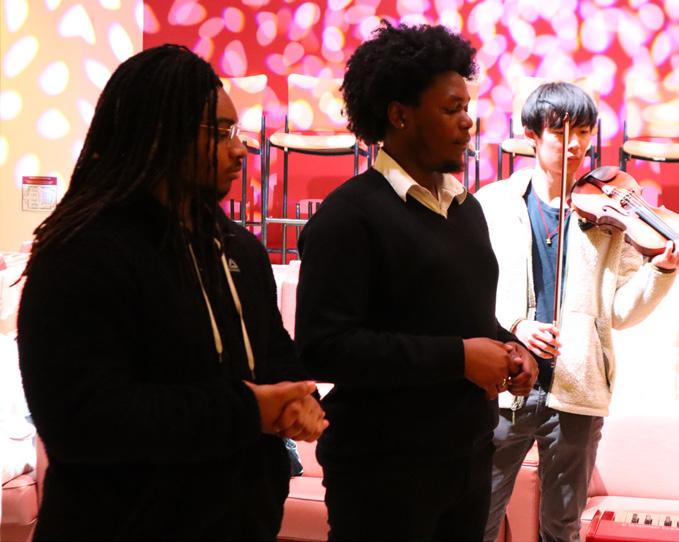 By AnGelinA li Assoc. News Editor
By AnGelinA li Assoc. News Editor
When third-year Boston College Law School student Charlie Davis first watched Survivor in 2020, he knew he wanted to be more than just a fan of the show.
This Wednesday night, Davis enters living rooms across the country as one of 18 contestants in the show’s 46th season.
“From the outset, I really just saw myself playing the game, you know, not just being a fan,” Davis said. “I was always imagining myself in the scenarios that they were getting in in the game, the different strategic crossroads that players would be at, participating in the challenges.”
In the CBS reality TV show, contestants build shelters, search for food, and compete in challenges while voting each other out as the game progresses. The winner of the show—deemed the Sole Survivor—receives a $1 million prize.
See Survivor, A2
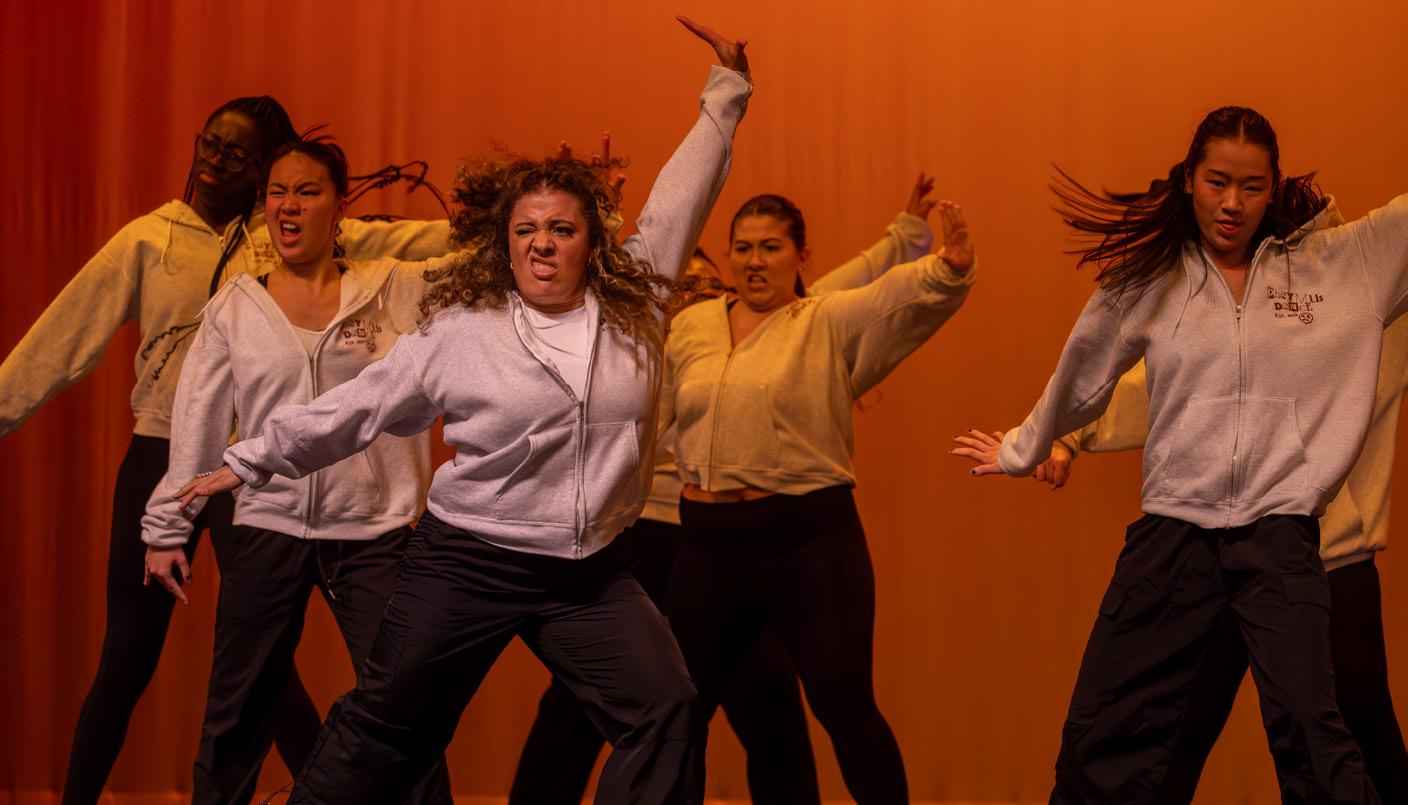
As students, alumni, and family members filled Robsham Theater on Saturday night, a slideshow of photos welcomed the audience to The Phuture , Phaymus Dance Entertainment’s 20th anniversary show. Pictures of current and past team members flashed by, and the early-2000s throwback outfits pictured were only the beginning of the show’s nostalgia.
Phaymus is a hip-hop dance crew established in 2004. Its 20th anniversary show,
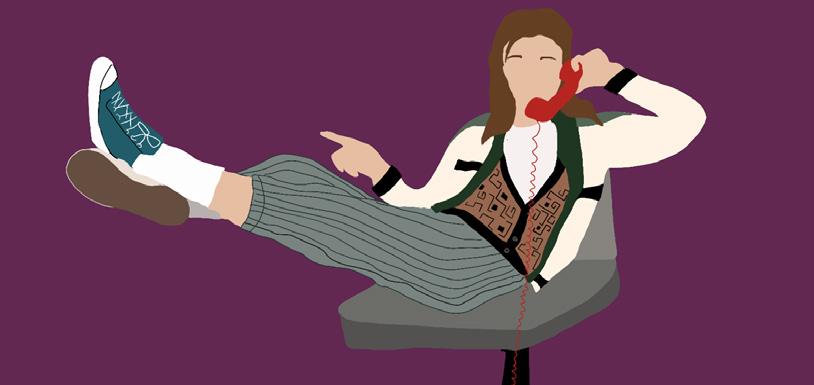
held at 7 p.m. in Robsham on Feb. 24, was a tribute to Phaymus’ decorated past and proof of its bright future as a group.
The show was hosted by two Phaymus alumni, Lexie Arteaga, WCAS ’25, and Grace Fox, CSOM ’22. The pair cracked jokes about their memories of Phaymus throughout the night and introduced Phaymus’ sets, which featured both old and new choreographies.
The first set was a tribute to Beyoncé’s Renaissance and its impact on the music and dance world, according to the hosts.
See Phaymus, A9
By AnnikA enGelBrecht Asst. News EditorStudents, faculty, and community members lined the walls of the Heights Room Thursday evening to hear Nadia Murad share her story.
“These conversations are more important now than ever,” Murad said. “The past year has seen so much conflict, so much pain, from Ukraine to Sudan, [Democratic Republic of the Congo], and all over the Middle East. Our fragile world is in such a precarious state.”
The Winston Center for Leadership and Ethics hosted Murad for the Clough Colloquium on Thursday.
Murad, recipient of the 2018 Nobel Peace Prize, activist, sexual violence survivor, and United Nations (U.N.) Goodwill Ambassador, was 21 when ISIS attacked her village of Kojo in northern Iraq, killing and capturing thousands of Yazidis, a religious minority group in the Middle East. ISIS killed Murad’s mother and brothers.
See Murad, A2

Murad remained a captive of ISIS for three months, during which she and thousands of other young girls were forced into sexual slavery. Murad escaped to Germany in 2014.
Murad said that while going public exposed her to the consequences of speaking out against rape, she felt an obligation to do so nonetheless.
“After sharing my story publicly, I had learned that rape and sexual violence go hand in hand with stigma, silence, and social exclusion,” Murad said. “But I knew I had a responsibility to fight for Yazidi women and girls, like my nieces, who had not been lucky enough to escape and could not yet speak out for themselves.”
Murad said she began advocating for survivors of conflict-related sexual violence after learning the stories of women across the world with experiences similar to her own.
“10 years ago, I did not have a plan—I do not think any activist does,” Murad said. “I did not know about the U.N. and how it worked. I had never left my small village, let alone Iraq. But once I had my story, and once I grasped its connection to the stories
of so many others, I knew silence was not an option for me.”
According to Murad, activism is a lifetime effort—and one without reliable allies.
“I've also learned that even big organizations and powerful politicians who say they support you will not always enact the ideas you put in front of them, no matter how compelling you think they might be,” Murad said. “And when that happens, you have to keep advocating over and over again, until the actions of one become the actions of many.”
Murad also said there is a lack of action by governments in prosecuting and holding members of ISIS accountable. Despite victim testimonies and evidence of crimes, only three ISIS members have been charged, she said.
“We have evidence of, you know, everything that we need,” Murad said. “But what is missing is political will.”
Iraq in particular has not done enough to support the Yazidis and help rescue the thousands of young women and girls still living in captivity, according to Murad.
“They don't care about people leaving,” Murad said. “They've not done anything to rescue the missing
women and girls, they've done nothing to hold those responsible accountable.”
Murad also said that ISIS and other terrorist groups use sexual violence as a weapon of war.
“They want to leave a permanent mark on the communities they attack,” she said. “That is not only mass murder or the destruction of their homeland, but it is through sexual violence, and the use of sexual violence. So sexual violence is not a side effect of war—it is a weapon of war.”
Murad said she created the organization Nadia’s Initiative to help establish a community in Iraq for Yazidi women and children. According to Murad, countries should be doing more to help refugees rebuild their lives back in their home countries.
“When the war is over, and when it's better for people to go back, why not invest in that, why not help people to rebuild their lives in a more sustainable way?” Murad said.
Although 10 years have passed since the Yazidi genocide, Murad said the Yazidi community is still reeling.
“The community is still healing and recovering from this genocide,” Murad said. “I don't think that this generation that went through it will
fully recover from what they have witnessed.”
Murad ultimately encouraged audience members to carry the stories of themselves and others with them when they advocate for the voiceless.
“Know your story, carry with you
the stories of others, no matter how difficult, and find people who are ready to listen,” Murad said. “And remember that when you speak out, you don't do this for you, your people alone. It's for those who are not ready or able to do themselves.” n
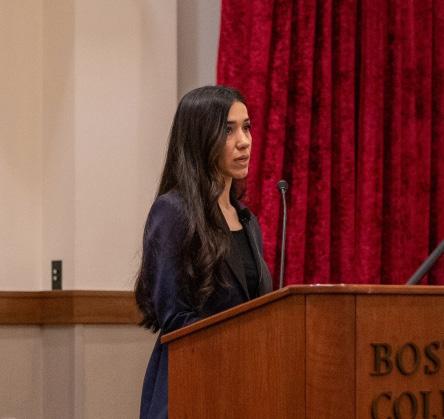
on AMC’s award-winning television show Breaking Bad, in Robsham Theater on Wednesday night.
After being diagnosed with cerebral palsy as a young child, RJ Mitte learned to view his differences as a source of strength rather than a setback.
“It’s transparency, communication, and believing in yourself,” Mitte said. “Believing in what you’re doing, believing in your actions, and not letting the judgments and other people define who you are, because you are capable of anything.”
The UGBC Council for Students with Disabilities hosted Mitte, best known for his role as Walter White Jr.
Mitte said that throughout childhood, his perception of his diagnosis of cerebral palsy was positively influenced by the physical disability his grandfather lived with.
“I grew up seeing people like me—I grew up with my grandfather who was in a wheelchair from a stroke,” Mitte said. “I never viewed what I had as abnormal, as something that was different from anyone else, you know? I thought everyone is experiencing challenges, and we all do in our own way.”
An important lesson Mitte learned was that he could decide what he was and was not capable of
doing in life, he said.
“The one lesson that my grandfather on my mother’s side taught me— that echoes with me today, that I hope I can instill in your mentality—is that ‘can’t’ is a decision,” Mitte said. “We choose what we can and cannot do.”
Mitte said he learned from a young age to form his personal identity independently of others’ opinions.
“No matter what people view you, how they look at you, how they look down to you, what they think your abilities are—that is their perspective,” Mitte said. “That is not who you are.”
Mitte said when he started going to school, he faced bullying from other kids, but that he recognized it stemmed from their lack of under-
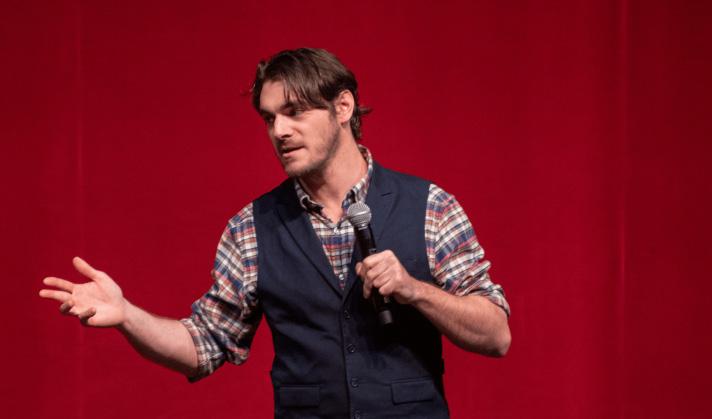
standing.
“I never let those people get to me because I knew they did not see who I am and what I’m truly capable of,” Mitte said. “They only saw the braces, the facade, the outer layer. And so … the first two weeks, I always had a bully. By the end of the two weeks, I had a friend.”
Mitte said he learned that being open to communication with others helped reduce the misunderstandings and conflicts.
“Communication is such a powerful tool,” Mitte said. “Being transparent and not letting ‘Oh, are they gonna misunderstand this? Are they gonna do this?’ [affect you]—being who you are will open a lot of doors.”
Mitte said he began his journey with Breaking Bad when he was only 13 years old, auditioning for his role five times over the course of six months.
“I go in one day, I audition in front of casting, and they say, ‘Oh, you were great, so we have a plane booked for you for tomorrow at 6:00 a.m. to fly to Albuquerque, New Mexico,’” Mitte said. “‘You’re going to do one final audition.’ And so I got on the plane, packed my backpack, left my mom, went to Albuquerque, and there is Vince Gilligan, Bryan [Cranston], and Anna [Gunn].”
According to Mitte, he and the Breaking Bad cast were unaware of how big the show would become when they began filming the first season.
“We knew we had something special, but we didn’t know what,”
Mitte said. “But we loved what we were doing, and the stories that were going on, along with the realities of truth we were able to tell through this journey.”
Mitte said being on Breaking Bad helped him gain a platform that he now uses to advocate for disability rights on and off the stage.
“I’m very lucky—I’ve traveled all over the country,” Mitte said. “I was just working in Romania with disability rights advocacy, different movements, seeing different walks of life and realizing we’re all facing the same challenges. We all have not the same issues, but similar issues.”
Mitte said his character provided a more holistic representation of someone living with disabilities.
“Now, we are very lucky that representation is a key component in society and especially in media, but in the beginning, with Breaking Bad, we didn’t really have a character that wasn’t just disabled,” Mitte said. “I didn’t see him as a disabled kid, I saw him as Walt Jr., I saw him as Flynn. I saw him as the young man that wants to make a life, that wants to have journeys.”
Mitte concluded the talk by encouraging the audience to learn what helps them better understand those around them.
“We all have something,” Mitte said. “Sometimes we don’t know what that something is, but learning to recognize it, learning to grow with it, learning to understand it will help you understand others, to learn from others.” n
Survivor, from A1
Davis said he submitted applications
“When I found out I was on, it was just pure shock, joy, elation— just every adjective you can think of all at once,” Davis said. “I’ve been applying since 2020, so for years. For me to finally get that call and for them to tell me ‘Hey, you’re going to be flying out to Fiji to play this game,’ was absolutely incredible, you know, my dream came true in that moment.”
This love of Survivor led Davis to build a community of fellow fans among his peers at BC Law, he said.
“I also have found so many friends through a shared love of the show, especially here at BC Law,” Davis said. “I’ve met dozens of people who are really, really into Survivor, and we meet every single week to watch the episodes on Wednesday.”
Survivor is, according to Davis, the greatest game in the world, given its intense reliance on physical, mental, and social strategy.
“Just from a gameplay standpoint, I’ve always said I think it’s the greatest game in the world,” Davis said. “There’s nothing that taxes you more physically, mentally, socially, strategically than the game of Survivor.”
Before going on the show, Davis said he expected his skills and
experiences as a law student would offer an advantage.
“I imagined that being a law student would be really helpful— just in terms of being persuasive, being able to talk to people and connect with people, and really just think and process very quickly but also at a deep level,” Davis said. “Those are all skills that law students have, but you’ll just have to see if they suited me well on the beach.”
According to Davis, rather than trying to emulate a previous contestant’s playing style, his main strategy was to be as authentic as possible.
“The bottom line of Survivor is you go in as yourself,” Davis said. “You can’t emulate someone else. You can’t be fake. You must be just
authentically who you are. So my strategy going in was to really just gather as much information as I could and trust my instincts because I can’t be a Tony Vlachos or Natalie Anderson, or a Christian Hubicki, I can only be Charlie Davis.”
Davis said the uncertainty of the challenges included in each season makes preparing for Survivor a nearly impossible task. “I think the most important thing is to just go in there with an open mind and confidence and mental toughness, and that’s going to be your biggest strength—that was sort of my philosophy going in,” Davis said. Davis said being a cross-country runner in his undergraduate years at Harvard University pre -
pared him for the physical discomfort and perseverance the show would require of him.
“I think being a runner really helped with that because running is really about pushing through pain and putting yourself in a state of discomfort and still pushing through,” Davis said. Davis advised viewers who are considering applying to Survivor to “just go for it.”
“If you’re dreaming of going on Survivor, make a three minute audition clip and submit it,” Davis said. “You never know what can happen, you know? The worst is your life just stays the same. Best case, you could be going on a trip and the adventure of a lifetime to Fiji.” n
Similar to Robert Frost’s poem “The Road Not Taken,” Stuart Weitzman said he began his career in shoe design by going off the beaten path.
“‘Two roads diverged in a wood, and I took the one less traveled by,’” Weitzman quoted from Frost’s poem. “That’s made all the difference. That’s how he ended the poem. And that’s how I began my career.”
Weitzman, an entrepreneur, designer, and philanthropist best known for his shoe brand, Stuart Weitzman, visited Boston College on Wednesday to speak at an event co-hosted by the Winston Center for Leadership and Ethics and the Shea Center for Entrepreneurship.
Delving into his philosophy on entrepreneurship and the history of his brand, Weitzman said gaining industry experience was crucial to founding his own company.
“The worth of education—let’s say that’s one to 1000,” said Weitzman. “But experience is one to infinity.”
Weitzman said he worked at a shoe company for five years before opening his own company, where he gained valuable business knowledge.
“It’s like I was not a startup,” he said. “I was already in business with all that experience.”
Weitzman then discussed business truisms that guided him in growing his brand—the first being risk-taking.
“Risk is your absolute best friend,” said Weitzman. “You can’t achieve great things without taking risks.”
Weitzman also emphasized the importance of risk-taking in business, which he said inspired him to find a niche in the shoe designing market.
“I noticed on the red carpet ... every actress was in a different dress ... but many had the same shoe,” Weitzman said. “If I could create a shoe for all of them—that would be unique to them—maybe I could get my product in the public eye, on the red carpet. Maybe I could find my niche.”
Designing and creating unique shoes for celebrities gave Weitzman’s brand the initial exposure it needed, he said. As celebrities like Aretha Franklin gave Weitzman credit for his shoes, millions of viewers and celebrity stylists were introduced to his brand.
Weitzman also emphasized the importance of originality and creativity in making business decisions.
“Nothing probably could ever keep you more different and more competitive against your competition than your own imagination,”
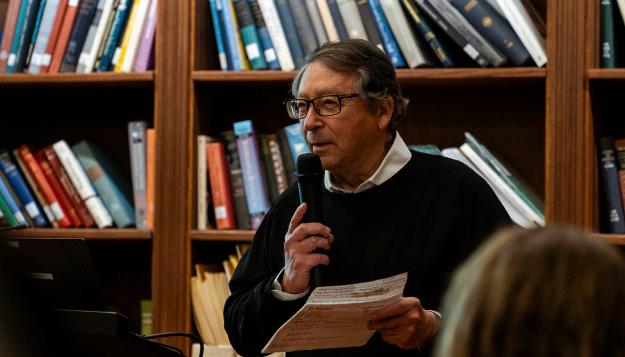
Weitzman said. “You have to hang on to that.”
When he first entered the industry, Weitzman said he could not afford the models that heritage shoe brands relied on for their successes. In marketing, Weitzman said he took the road less traveled by emphasizing his brand and company image, rather than his shoes, in advertising.
“Do something that’s yours, that’s unique, that catches attention,” Weitzman said. “It will pay off many more times than the cost of doing it.”
Weitzman also said using new and unique sources of inspiration was an important part of distinguishing a brand. “If you are looking for inspiration in the field you end up in, do not pay attention to what your competitors are doing,” he said. “That’s like a rotten apple in the basket … I looked past my competitors and I looked for people who definitely were not my competitors.” Weitzman said he looked to gladiator sandals from ancient Rome, Dr. Martens boots, and Julia Roberts’ boots from the film Pretty
Woman as inspiration for his shoe designs.
“It’s not limited to a fashion product,” he said. “It’s only limited to your imagination. And I’m sure in whatever field you’re in, you can think that way and create muses to help you be inspired.”
When starting a brand, asking for help and insight is essential, Weitzman said.
“It’s so obvious you can’t do almost anything alone,” Weitzman said. “Or if you think you can, you can do it better with a little help elsewhere.” n
At least 1,600 institutions have divested from fossil fuels as part of the global divestment movement, according to Juliet Schor, professor of sociology.
Absent among those institutions is Boston College, she said.
“We have to ask the question, ‘Why is Boston College not on that list yet?’” Schor said. “You can see here who is divesting—faith-based organizations are the largest fraction of these institutions.”
Climate Justice at BC (CJBC) and UGBC co-hosted an event on Wednesday in honor of Global Divestment Day, calling for the University to divest from fossil fuels.
“We have an undisclosed amount of money within our school’s endowment invested in the fossil fuel industry, and as members of the community concerned with climate justice and global injustices, that’s one of our main means of fighting injustice within our club,” said Gabriela Levitt, president of CJBC and MCAS ’24.
According to Alexandra Le -
rmond, director of UGBC’s Environmental and Sustainability Division and MCAS ’24, Global Divestment Day was created in 2015 to pressure fossil fuel companies to divest.
“It’s just a day that was sort of created back in 2015, where a bunch of groups called upon the top—I believe it was the top 200— fossil fuel companies to divest, and so it’s just become a day that resembles or symbolizes this collective action for this movement,” Lermond said.
“We have an undisclosed amount of money within our school’s endowment invested in the fossil fuel industry.”
Schor said fossil fuel stocks may eventually lose their value if the global community decides to switch to different sources of
energy, at which point fossil fuel companies will be forced to find other means of profit.
“Those companies are going to have to write off all of that, and many of them will go out of business in the same way that many of the coal companies have already been going out of business in recent years,” Schor said.
According to Schor, divestment from fossil fuels has both moral and social components. Schor said fossil fuel extraction is an immoral act because of the toxic impact it has on sites of extraction, which she called sacrifice zones.
“It’s not just about what’s going to happen to the climate,” Schor said. “It’s also about what’s happening to the people who live around these fossil fuel extraction locations, because it is a highly toxic product and they’re exposed to tremendous toxins.”
According to Schor, there are also strong racial and economic class disparities among the populations living in sacrifice zones.
“The people who are exposed are much more likely to be Black, to be Latino, to be Indigenous, to be working class,” Schor said. “If
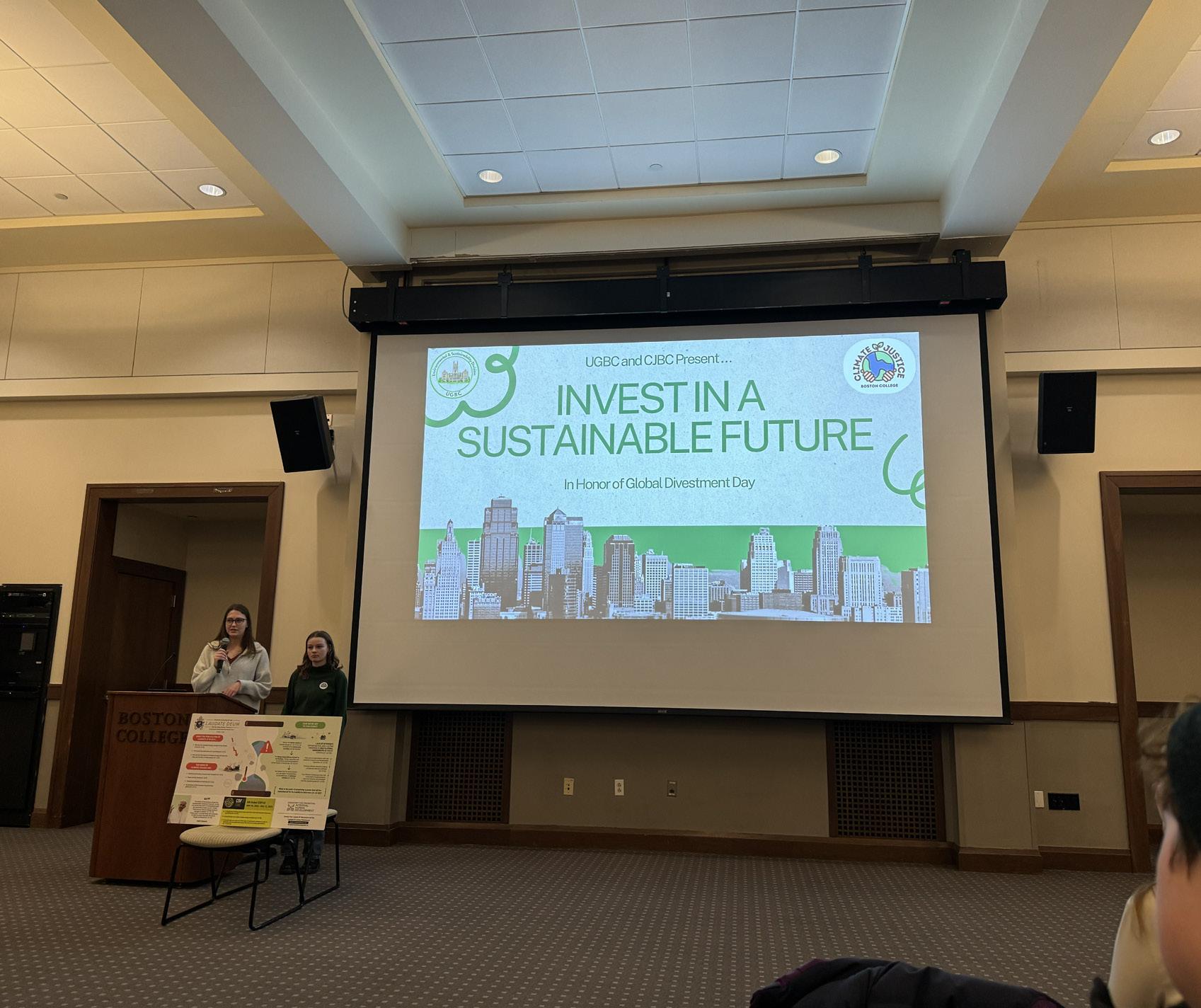
you look in wealthy areas in this country, and particularly wealthy, white areas, there are no fossil fuel extraction locations.”
Schor said the destabilization of the climate will also be felt the most in the “Global South,” which are areas that have historically been the least involved in fossil fuel extraction.
“Impacts are going to be much greater in the so-called ‘Global South,’ the place where more people who are Black and brown live,” Schor said. “And [there will be] much less impact in the northern part of the globe, which is predominantly where whites live. Making it even worse, it’s the northern parts of the globe which have caused the problem historically.”
“It’s also about what’s happening to the people around these fossil fuel extraction locations, because it is a highly toxic product and they’re exposed to tremendous toxins.”
Schor said divestment is ultimately about taking legitimacy and operating power away from fossil fuel companies.
“[It’s] more about what we can do to the share price and these companies through mounting a movement to say, ‘These companies should not be allowed to operate because they have a toxic product which is destabilizing the climate, leading to uninhabitable Earth in ways that have gross injustice associated with them, but also peril for all the species on Earth,’” Schor said.
Strad Engler, a member of the St. Ignatius Parish Green Team, discussed the role of the Catholic Church in fossil fuel divestment, reading from several of Pope Francis’ encyclicals.
“In Laudate Deum, the most recent letter from Pope Francis, [he wrote that] we need a transition towards clean energy, and it’s not progressing in the necessary way—we need to act more,” Engler said.
According to Engler, Pope Francis formed the Laudato Si’ Action Platform, a seven-year program addressing the mounting climate crisis. Engler said St. Ignatius Parish joined the program in an effort to take smaller steps toward divestment.
“It’s not just divestment,” Engler said. “It’s also investment. It’s also thinking about how any activity that we’re doing is going to harm the planet and each other.”
Engler showed the audience a master plan that BC developed in 2008 while it was renovating many areas of campus. The plan included ideas on how to implement sustainable initiatives on campus, Engler said.
“Their goal is that—as part of your living on campus as well as your education—you are learning about the principles of care for creation, both in what you hear in the classroom and what you practice in your living on campus,” Engler said.
Engler said while many of the master plan’s initiatives did happen, such as building a sustainability garden and creating the Office of Sustainability, other ideas are still in the works.
“The other things that they have here, things like an inventory of greenhouse gas emissions, annual updates, those things have kind of slid away, so they haven’t been happening,” Engler said. “There’s an opportunity if Boston College were to reengage with this plan and say, ‘Oh, that was a good plan then, and it’s actually still a good plan.’”
Though the University has not divested yet, it is better to personally avoid using fossil fuels than to do nothing at all, Schor said.
“In a world oriented around fossil fuels, it can be hard to avoid them,” Schor said. “But do your best. Do the things that you can. Do more and more every year, and, of course, it is getting easier, year after year.” n
People bowed their heads and fell silent as Julie Canuto-Depina, this year’s recipient of the Martin Luther King, Jr. scholarship, asked attendees at the scholarship ceremony to join her in prayer.
“I give thanks for all those who stand here before me in celebration of Dr. Martin Luther King and his values,” Canuto-Depina said. “I also want to pray for the other finalists, who you have helped shape and bring to this moment, and I pray that—in all of our hearts here in this room—that we continue to fight for social justice and racial justice.”
Canuto-Depina, CSON ’25, was announced as the winner of the Martin Luther King, Jr. Memorial Committee’s 42nd annual scholarship in a ceremony on Tuesday night.
Canuto-Depina will receive up to $35,000 toward her senior year tuition and a $1,000 credit to the Boston College Bookstore.
The scholarship is awarded to a BC junior who demonstrates academic excellence, community service, leadership in extracurricular activities, and involvement in the African American community, according to the committee’s website.
Canuto-Depina said she is studying nursing with the hope of one day working to improve health outcomes for patients—especially patients from disadvantaged backgrounds.
“By addressing social determinants of health, we can help narrow health care gaps and ultimately
leverage delivery of health care and health outcomes for all patients,” Canuto-Depina said.
Apart from Canuto-Depina, four other finalists—Esther Udoakang, CSON ’25, as well as Tracy Aggrey-Ansong, Joy Babalola, and Temidayo Lukan, all MCAS ’25—were chosen from an initial pool of 28 applicants. Each will receive a $3,000 tuition scholarship and a $1,000 credit to the Bookstore.
“They aspire to change. They have invested themselves in helping make not only Boston College but our world better.”
Canuto-Depina was presented with the scholarship by University President Rev. William P. Leahy, S.J., who praised the five finalists for their commitment to social justice and their contributions to the BC community.
“They aspire to change,” Leahy said. “They have invested themselves in helping make not only Boston College but our world better.”
Christie Louis, MCAS ’24 and last year’s recipient of the scholarship, said she saw firsthand how Canu -
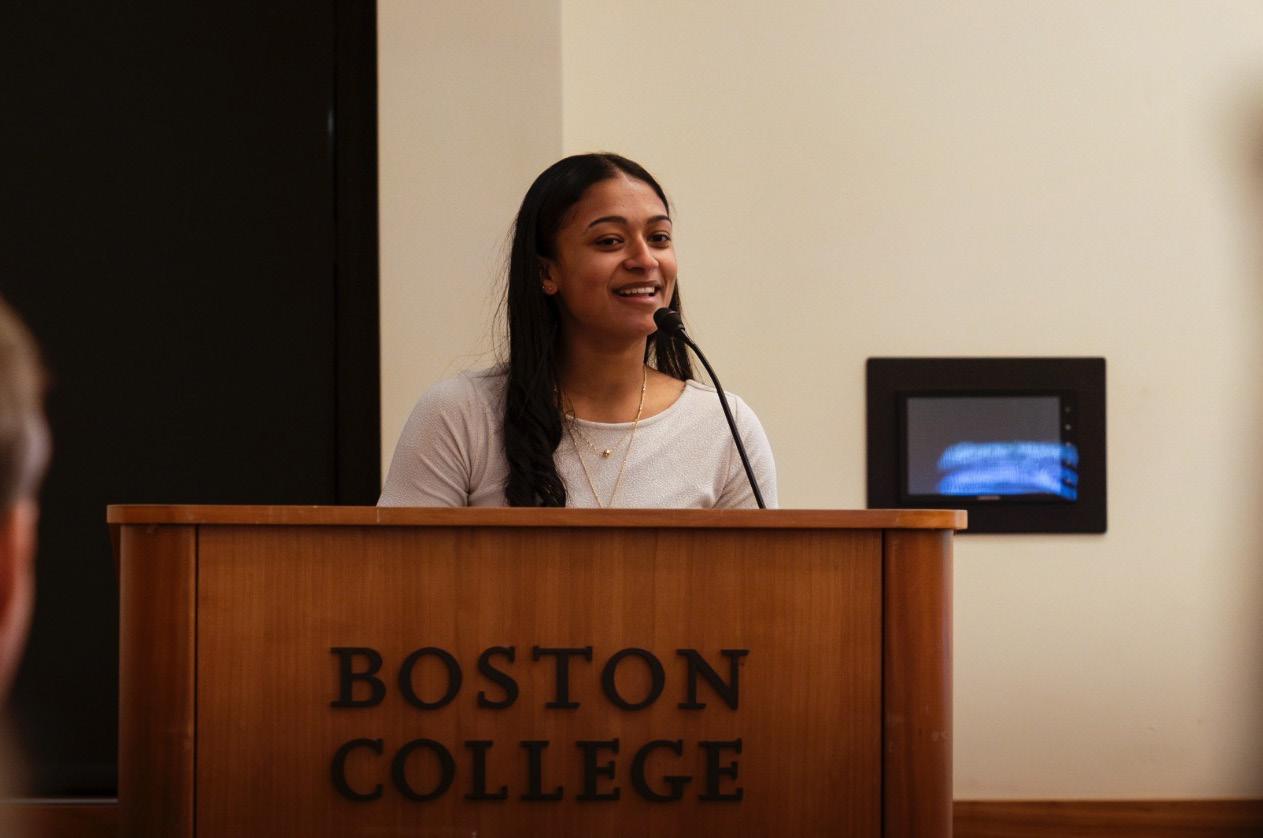
to-Depina embodied both King’s example and Jesuit values as a leader on the Jamaica Magis service immersion trip.
“Both leading up to the trip and in Jamaica, you embodied what it meant to be a servant leader,” Louis said of Canuto-Depina. “You led selflessly and left a mark of love in the students’ hearts that calls for them to be a man or a woman for others.”
Aside from her involvement in the Connell School of Nursing and Jamaica Magis, Canuto-Depina is also on the executive board of the Cape Verdean Student Association of BC, an intern at the Thea Bowman AHANA and Intercultural Center,
and a student ambassador for the Montserrat Office.
“During my time at Boston College, I have come to understand that I am not only a nursing student, but I possess the capacity to be a change agent for progressive social awareness and have grown a strong desire to advocate for my patients and my peers within my school community,” Canuto-Depina said.
Philip McHarris, BC ’14 and the 2013 recipient of the scholarship, delivered a keynote address reflecting on how King not only advocated against racism, but also decried poverty and militarism. “His call to eradicate racism,
poverty, and militarism in all forms resonates with the urgency of our current times, reminding us that the journey towards justice and equality is ongoing,” McHarris said.
Canuto-Depina encouraged attendees to be selfless, stressing that even seemingly small actions can have significant impacts on other people.
“One piece of advice that I would share with you all is always ask yourself, ‘What is it that you can be doing for others?’” Canuto-Depina said. “It doesn’t have to be for 1000 people—it can be for just one person, your wife, your kids, your cousins, your classmates, professors, whoever that be.” n
The UGBC Senate hosted two members from the Office of Residential Life (ResLife) to discuss improvements to the housing process at its meeting on Monday night.
“Even though I have lived in a lot of the residential halls on campus, I’ve never gone through the process,” Dorrie Siqueiros, director of residential education said. “So being able to talk to someone who has gone through that and navigated it is sometimes much more helpful than the FAQs and things like that.”
According to Siqueiros, ResLife is in the process of creating an advisory group for Living & Learning communities (LLCs) and working to add an academic component to some pre-existing LLCs.
“Any LLC that exists at BC should be linked with some sort of academic requirement,” Si -
equeiros said. “If you’re familiar with the LLCs, not all of them right now meet that standard, so we’re really trying to … put them in compliance with that idea of having an academic course as part of it.”
Cristina Gregory, student senator and MCAS ’26, suggested ResLife allow transfer students to fill empty spots in suites to prevent people from being kicked out of housing groups that are trying to fill a certain number of spots and acquire a suite.
“It would be a way of kind of transitioning transfers more into Lower, into communities and suites, but also not creating a scenario in which groups are kind of feeling like they have to get kicked, or two people, one person is getting kicked,” Gregory said.
Caitlin Codding, director of housing operations, said ResLife may be open to this possibility, but that the comfort of transfer students is also important to take
into consideration.
I think the other component that we would just want to consider is the experience of that transfer,” Codding said. “Feedback that I have received from transfers—and transfers in the rooms—is oftentimes it can be isolating to be that one person.”
Colleen Blascik, first-generation student representative and MCAS ’27, asked whether ResLife would be willing to work with the Montserrat Office to supply students with funds for dorm room necessities.
“I was wondering if, in the past, you guys have ever partnered with [Montserrat] and given them a grant in order to disperse to Montserrat students to possibly get … the basic necessities that we might need access to,” Blascik said. “I do know that Monsterrat does have things for food, clothing, and things like that, but there’s also the dorm experience.”
While Siqueiros said ResLife would need to consider funding,
she said it is open to the idea and always looking for ways to make residential living an equitable process for students.
“We are always open to partnering and improving the student experience, so I think it’s a matter of identifying what the ask is and—if not funding—how we can support that, what are ways in general to make the residential experience as equitable as possible,” Siqueiros said.
At the end of the meeting, UGBC Vice President Meghan Heckelman, LSEHD ’25, introduced Alessandra Veveiros, MCAS ’27, as the new international student representative.
Veveiros said that while she was born in the United States, she has lived in Uruguay, England, Indonesia, Nicaragua, and Kenya.
“I hope to advocate for the international students here,” Veveiros said. “I’m very excited.” n
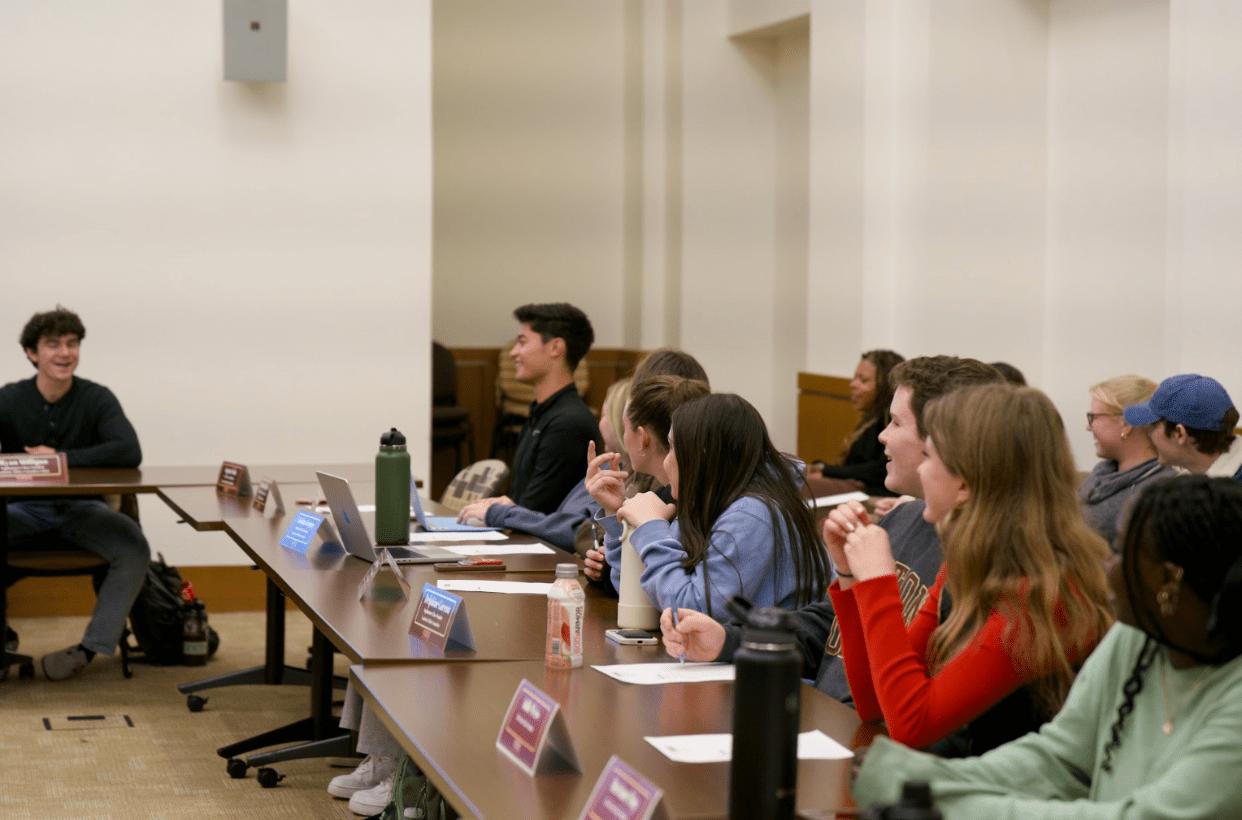
Facial recognition technology poses privacy and security threats to everyone, according to Kade Crockford, director of the Technology for Liberty Program at the American Civil Liberties Union.
“The way that it can facilitate mass surveillance and centralized control is a sort of perfect tool of authoritarianism and poses many threats to privacy and civil rights and civil liberties,” Crockford said.
On Wednesday, Boston College Law School’s Rappaport Center for Law and Public Policy hosted a panel to unpack privacy, profiling, and safety concerns regarding facial recognition technology.
According to Crockford, the legality of using facial recognition, for both the government and privately-owned companies, is
ambiguous.
“You don’t even necessarily have to be suspected of a crime to be subjected to one of these [facial recognition] searches,” Crockford said. “That’s concerning to us because it’s such a low standard that really anyone who’s tangentially related to a criminal investigation could be subjected to one of these searches.”
Massachusetts laws regarding the use of facial recognition are limited to residents of the state, which also poses problems, according to William G. Brooks III, chief of the Norwood Police Department and one of the panelists.
“What if we have a getaway vehicle that’s got Rhode Island plates?” Brooks said. “I can’t run my photo against people in Rhode Island? I can only run them against people from Massachusetts? What sense does that make?”
Former Massachusetts Supreme Judicial Court Justice Elspeth B. Cypher, another panelist, said current facial recognition software presents racial and gendered biases, which can result in falsely identifying perpetrators of a crime.
“The algorithm, which is usually trained on white people, and usually they are going to make mistakes on women, Africans, and African Americans. These were not people who were included in the datasets when the algorithms were being created.”
Still, facial recognition can and has been used positively, Brooks said.
He recounted an incident in Masachusetts where an unconscious individual was sent to a hospital without any forms of identification. Without identification or a locatable medical history, the doctors were unable to assess
or give treatment to the individual, Brooks said. “Police came in, took a photograph, sent it to the state police, ran it against the gallery for facial recognition, identified the patient, and contacted his family,” Brooks said. “So there’s community caretaking in emergencies that is envisioned by the statute.”
Nevertheless, facial recognition must be used in conjunction with human judgment and decision making, the panelists agreed.
“You’ve got to have a human being in the loop,” Cypher said. “You cannot just let the machines work their magic. So when the match is made, some human being has got to double check and really look at it.”
Without this standard in place, careless mistakes are made, Crockford said. They discussed a shoplifting incident in which the store sent low-quality images from their
surveillance cameras to the police and an innocent individual was arrested.
“They arrested him on the basis of [facial recognition] alone,” Crockford said. “That is terrible police work … it is human error as much as it is error in the system that leads to those negative outcomes.”
According to Crockford, many private companies are collecting biometric data from users without their consent, which is also harmful. They said private companies should aim to receive meaningful consent from users for protective purposes.
“That doesn’t mean you click ‘yes’ to agree to a long terms of service that you didn’t read,” Crockford said. “It’s actual, meaningful consent that’s separate from other terms, that says, ‘Yes Apple, you can collect my biometric information.’” n
Fattman expressed frustration at the lack of exceptions made for students who must miss school during a week when they had planned to be on vacation.
“These kids are required to be in school to practice or whatever, which I think is a complete mess that we should have gotten an exemption from,” Fattman said.
Newton South High School teacher Chrysolite Fitzgerald said NPS is being strict on teacher absences during the would-be vacation week.
“They’re being hypervigilant about it, like you will be fired if you don’t follow our protocol, which is, just doesn’t feel very nice,” Fitzgerald said. Teachers are not allowed to take personal days during this week, and sick-day requests must be verified with a doctor’s note. In anticipation of widespread student absences, district leadership said teachers could not teach any material during the week that their students would be tested on later.
Fitzgerald, who is a math teacher, said one of her classes will work on a group project, while
another will do a digital escape room activity to review previous material.
“This is like, for the kids that are there, they’re going to get extra review but in a fun way,” Fitzgerald said.
Between 30 to 50 percent of NPS students were absent on Tuesday, the first day of the previously scheduled vacation.
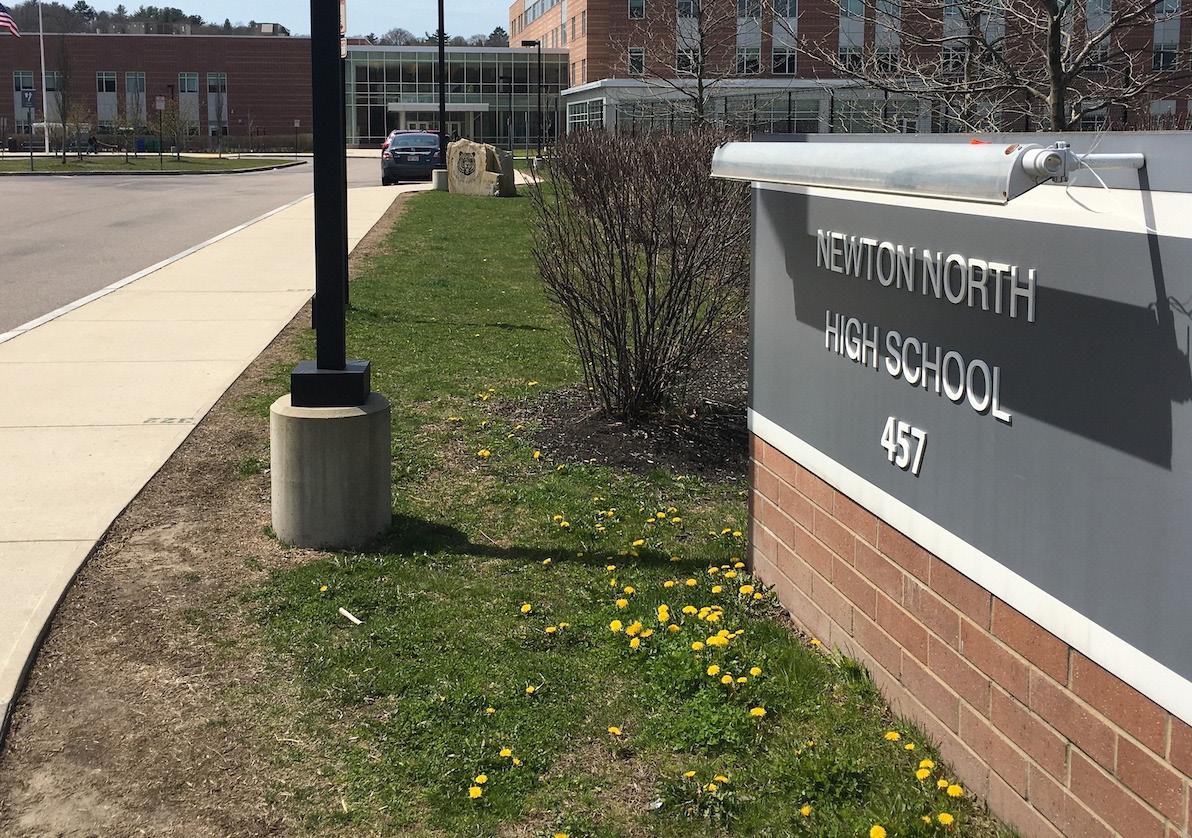
Public sector strikes are illegal in Massachusetts, and the Newton Teachers Association will pay a total of $625,000 in fines for its strike—$275,000 to NPS and $350,000 to the state. n IMAGE COURTESY OF WIKIMEDIA COMMONS
Mayor Ruthanne Fuller spoke before the Newton City Council expressing her confidence in the city’s future despite recent challenges, such as division over the teachers strike and the new zoning ordinance, in her State of the City address Tuesday night.
“These headwinds weigh heavily on all of us, fraying social bonds, eroding confidence in our democratic
institutions, and fertilizing the dual maladies of anxiety and distrust,” Fuller said. “Yet, in spite of all these seemingly intractable issues, I can’t think of a better place than here in Newton.”
Fuller began her speech by listing increasing housing prices, zoning disagreements, the teachers strike, traffic congestion, migration, and environmental issues as key issues from the past several years. She explained that despite these challenges, she remains ener-
geteic and optimistic in the work being done in the areas of education, future governance, and infrastructure.
“We have a visionary, energetic new superintendent focusing on high standards, high supports, and high respect,” Fuller said. “Superintendent [Anna] Nolin brings a track record of using metrics, accountability, and communication to drive both decision making and excellence in learning.”
Fuller further emphasized the city’s commitment to Newton Public

Schools (NPS) in the upcoming fiscal year’s budget.
“Two months from now, I’ll be proposing a city budget that, as always, increases the funding for our schools,” Fuller said. “This year the increase will be another $14 million for a total budget for NPS of $282 million dollars.”
Fuller spoke optimistically on the ongoing changes in the community, such as environmental initiatives, the Newton Thrive program, an updated Tree Preservation Ordinance, and the newly enacted zoning ordinance.
“As a result of recently updated village center zoning, affordable and market-rate housing mixed in with retail and restaurants will be more possible,” Fuller said. “This zoning stems from a combination of hard work and compromise by city councilors backed by a new state law.”
Additionally, the city is working on many public facility improvements, according to Fuller. She listed four new school building projects in the works, a project regarding the Jackson Homestead and Museum, police station overhauls, and several municipal buildings that will be undergoing conversions to become fully electric.
“With this additional solar, close to 40 percent of our total municipal electricity consumption will be offset by our solar arrays,” Fuller said.
Alongside new investment plans for parks and recreational spaces,
accelerated road paving using the American Rescue Plan Act (ARPA) funds and free cash, new traffic calming measures, and bicycle roadmap plans, Fuller said infrastructure updates in Newton are progressing rapidly.
Fuller also revealed the upcoming senior center, informally named Newton Center for Active Living, will officially be the Cooper Center for Active Living in honor of Newton resident Audrey Cooper, who passed in 2021.
Cooper served as a secretary at Underwood Elementary School for 27 years. She worked at the nonprofit Family ACCESS, aiding in the establishment of many of its programs. She was also a volunteer and trustee at the Newton Free Library. Among many other contributions within the community, Cooper helped establish the first-ever Newton Senior Center.
“Let us be led by the example of Audrey Cooper as we resolve to strengthen our civic body with stronger bonds,” Fuller said.
Fuller concluded her speech by reiterating the power of Newton’s iden tity when it comes to problem solving.
“While we have different opinions, we are all Newtonians and we are all committed to this community,” Fuller said. “By working collectively and collabratively, we can address the issues that divide us with solutions that unite us.” n
B y B rendan O’F rie L Heights Staff
Community members gathered Saturday afternoon at the Newton City Hall War Memorial Auditorium for the Tanglewood Marionettes’ performance of Cinderella.
“I usually fill the room when the Tanglewood Marionettes come to town,” said Paula Gannon, director of Newton Cultural Development.
According to Gannon, whose organization helped sponsor the show, the Tanglewood Marionettes have performed in Newton for over 25 years.
“They are a really seasoned marionette company,” Gannon said. “They travel a lot throughout the state. After seeing them once or twice, I decided they’ve got to be a staple, something that we bring back every year.”
Many children sat directly in front of the stage. According to Gannon, by sitting right by the stage, the children feel more immersed in the show by being able to engage more with the story.
Gannon appreciated the reactions of all the children who enjoyed the performance.
“Hearing all the squeals of
delight from the kids, I mean, I’ve seen this show many times over the years, and that never gets old,” Gannon said.
Waban resident Brigid Tobin, BC ’97, took her three sons to Saturday’s performance. While they have put on their own puppet shows at home, this was their first time attending a professional puppet show.
“I’ve never seen a puppet show before, and I think it was very, very entertaining,” Tobin’s son, Brendan, said.
Tobin expressed how her son had reservations about attending the show but ended up enjoying the performance.
“Coming in, he’s like, ‘I don’t want to go to a puppet show,’ but he’s in fourth grade, and he liked it, and so all ages can enjoy the marionette show,” Tobin said.
Brendan, a student in the Newton Public Schools, found the show particularly amusing and plans on telling his friends at school about the Tanglewood Marionettes.
“I liked this performance because it was funny,” he said. “I would recommend it to some friends in third grade that I have.”
Brendan also explained why he felt it was important Newton hold events like Satur - day’s marionette show.
“I think it’s important to bring people together,” Brendan said.
Gannon believes the story of Cinderella helped foster a connection within families, as the story has been popular across generations.
“ Cinderella is just a quintessential, traditional, classic story that has been told for ages,” Gannon said. “So you get parents and grandparents who remember the story and now want
and now want to share that down to other generations. So I think there’s a connection there among the families, just through the story itself.”
Gannon was pleased with the success of Saturday’s show, as she has a passion for the arts and providing events like the Tanglewood Marionette performances for the city of Newton.
life, to our joy, our happiness, our health and wellbeing, to being a community, to relating to others,” Gannon said. “It’s the arts that tie it all together. And so anything that my department can do to enhance that to bring forth opportunities for the community to just come together in a joyful way and experience the arts, I’m all for that. That’s what gets me up in the morning.” n
 IMAGE COURTESY OF NEWTON NEWS
IMAGE COURTESY OF NEWTON NEWS
A BC Dining meal is always made better by a reliable bottled drink— which hopefully you’re not stealing.
Like most, you probably go for the same thing each time you open one of those cluttered drink fridges. Here’s what your go-to bottled beverage says about you.
Core Power
She’s highly sought-after, controversial, and she is the moment.
Snagging one of these speaks to your commitment to and enthusiasm toward attaining your goals, no matter how high the obstacles (or how steep the prices) are. Your groundbreaking courage can only be fueled by the hefty protein punch a Core Power provides.
Canada Dry Seltzer
The classy choice, if not the boring one. If you’re reaching for these, you like to keep things simple and clean. You probably could afford to stray from the norm a little more, but you are otherwise unproblematic and chill. Except if you’re nitpicky about
whichever television static flavor you like—then you’re anything but.
Powerade
Nothing compliments chicken and two sides like a bright-blue sports drink. If this is your pick, you are definitely an extravert. The electrolytes and syrupy sweet taste keep you raising your hand in class, even when no one else will.
Gold Peak Tea
This drink boasts a juice content of zero percent and a whole lot of sugar. If this is what you reach for, you probably preach great advice that you never apply to yourself. Maybe you encourage neatness but leave laundry sitting on your desk chair, or you advocate for good boundary-setting while letting people walk all over you. At the very least, you definitely endorse healthy living while chugging Gold Peaks with every meal.
Fairlife Milk
A popular pick! With the extra protein boost and the clean-looking packaging, this drink is a people-pleaser, and so are you. You’re easygoing, agreeable, and you follow
trends with a tardiness that makes you more conformist than cool. You’re clearly also susceptible to bottled-milk branding tactics.
Minute Maid Apple Juice
You’re literally five. Why are you drinking this? Freudian regression is not the appropriate response to the stress of being an undergraduate student.
Minute Maid Orange Juice Spectacular, wonderful, breathtaking—you are a pillar of your community and an inspiration to us all, just like your chosen beverage.
BodyArmor
This more nutrient–heavy sports drink is fun and sweet, just like you! You are constantly on the move with your academic, extracurricular, and social commitments, but you’re also
down-to-earth and lovely to talk to. At times, you may think of yourself as more silly and quirky than you actually are—but don’t we all?
Hood Milk
No one is stealing this one. While often overlooked, the simplicity of this drink reflects a dairy-based tranquility that you may relate to. Your unassuming exterior hides a poignant depth and serenity. n

One-thousand three-hundred seventy days. Eight semesters. Four years. Each Boston College student's time on the Heights is unique and monumental. Yet every Eagle shares a common nest in Chestnut Hill. Through conversations with roommates, professors, alumni, and hallway chit-chats in between, I've compiled a list of "bucket list" items every BC student should do before walking down Linden Lane on graduation day.
Just down the hill from BC's campus lies the Chestnut Hill Reservoir. A 1.5-mile loop, the "res" is the perfect place to release stress on a run, catch up with friends on a casual walk, or read a book on one of its many benches. There's not a bad time to visit the “res,” but when in doubt, the golden glow of a sunset walk is always your best bet. I like to walk counterclockwise and start alongside the houses on Beacon Street. While it’s a bit windier due to fewer trees, car lights cheer you on as the path gently curves

westward to a gorgeous sunset over campus. The serenity of these walks are an unfailingly peaceful way to recenter myself before heading home for the day.
Remember how mind-blowing it was in elementary school when you saw your teacher at the mall or a restaurant? Even in college, it can be hard to picture professors outside of academia. But just like us students, professors have lots going on in their outside lives too!
Even amid their commitments, most professors are more than happy to meet with students outside of class time. Yes, BC requires them to have office hours, but perhaps taking the time to discuss something other than schoolwork makes all the difference— for both you and them. Grab coffee, attend one of their lectures, or even hit them up on LinkedIn.
Participate in BC's Traditions
BC is known for its traditions. In the fall, participate in the chaos of the activities fair and tailgating. Wear your best maroon and gold while cheering on the Eagles in Alumni Stadium. Seniors, don't ever pass up time in the mods. Run the Red Bandana Run in honor of Welles Remy Crowther, an alum who gave his life in service to others on 9/11.
As temperatures cool down, see
campus light up at the Christmas Tree Lighting and watch St. Ignatius Church glimmer with candlelight at the Christmas Mass. Start the new year off right by packing the T on the way to the Beanpot and remind all those Terriers that it sucks to BU. Get your groove on at ALC Showdown and make sure to cheer on runners as they cruise down heartbreak hill at Mile 21 on Marathon Monday. The best way to get to know BC is to be BC.
Take a Moment to Retreat
Time passes all too quickly at BC—retreats are an opportunity to slow down. Retreats allow students to pause, reflect, and find gratitude through their attentiveness to themselves or others. Many occur at locations away from BC’s main campus. As a Jesuit, Catholic institution, many retreats are run by BC's Campus Ministry program. Designed for students of all faith backgrounds, popular retreats like Kairos and the Manresa Silent Retreat focus on intentional reflection on relationships and spirituality. A bit of advice—if you haven't entered yourself into the Kairos lottery, do so now. I promise you won't regret it!
The Center for Student Formation has retreats centered on vocational discernment to help students discover how their joys and strengths can serve others. Freshmen should check out mentorship programs like
Ascend and Freshman League, while Halftime is geared to sophomores and juniors.
Explore the Hidden Nooks of Campus
We've all taken a Gasson Gram— if not, add that to your bucket list! While Gasson never ceases to provide a bad photo, BC is full of hidden wonders to add to your camera roll. Take a stroll around campus without a set destination. The best way to find yourself and learn about BC is to lose yourself in the surroundings.
Need a place to start? Venture over to St. Mary's Hall. A marble altar, carved oak ceiling, and detailed stained-glass windows make its chapel a true "Gothic gem," as a Jesuit once described. Or, walk across Linden Lane and get a tour of the Burns Library Archives with collections of historic Irish and Bostonian culture. Take a hike up the million dollar stairs for once (because we all take the Maloney elevator) or climb up Gasson Tower to see the bells. If the quads are a bit too crowded for your lunch break and reading session, sit in the Pine Tree Preserve, a forest tucked next to the Margot Connell Rec Center. Hidden gems are everywhere on this campus—who knows what discovery you will make.
Read

Star Market
Whole
If
If you frequent Star Market, you are either living on Upper Campus and have the ability to walk there, or you have an unlimited budget. You aren’t as stuck-up as a Whole Foods shopper, but you want to be. Your jacket may not be Canada Goose, but it was still expensive. But ultimately, you still ran to put the peanut butter back on the shelf when the cashier rang it up for $8, and you definitely didn’t splurge for the plastic bag fee, even though you forgot to bring your reusable.
Trader Joe’s
If Trader Joe’s is your go-to, you are basic but don’t want to admit it. Even though you claim the crowds are anxiety-inducing, you keep going back each week. It’s a safe bet, cheap, and
the frozen-food section is unparalleled. You crave convenience and frugality over any mainstream branding. Still, don’t let yourself start thinking this makes you better than everyone else. It doesn’t. You are everyone else. And everyone else is equally as drawn to Trader Joe’s Steamed Chicken Soup Dumplings.
Wegmans
If you shop at Wegmans, you gatekeep your recipes from your roommates and laugh when they forget to salt their pasta. You spend way too long in the olive and cheese section, dreaming of a charcuterie board you will never actually make—you bought the olives for it once, but they spoiled in the back of the refrigerator you share with seven other roommates before you could put them to use. Still, you say Wegmans has a great olive and cheese section, and you will die on that hill because you believe your taste
is superior.
Stop & Shop
If you get your groceries at Stop & Shop, you’re not so caught up in the aesthetics of grocery shopping—you care about the prices. This place is by and large the cheapest on this list. If you frequent Stop & Shop, you are brave. You aren’t
too worried about the onions you bought being almost rotten or the scary-looking construction that’s been happening all year. You sacrifice flavor, quality, and ambiance to save a few dollars. Your hair may be messy, and the grocery store may be scary, but you are saving all your money for an extra drink at the bar this weekend. n

The opinions and commentaries of the op-ed columnists appearing on this page represent the views of the authors of those particular pieces and not necessarily the views of The Heights
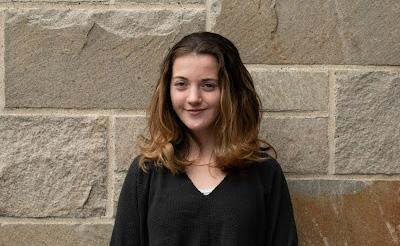
Conventional wisdom suggests that as you progress through your four years of college, you’ll begin to assume increasing levels of responsibility in all aspects of your life. In many ways, this is true, especially for Boston College students. Ask any senior on campus right now and they’ll probably tell you they’re on the board of some club, TAing for some class, and on the hunt for an impressive post-graduate opportunity.
Amid this climb, however, there is also the common phenomenon of a burnout so infectious, it’s earned its own name: senioritis.
By senior year, a lot of BC students realize that they don’t actually want to run the clubs they’re in anymore. They just want to continue to be a part of the community by coaching from the sidelines while letting some amped-up sophomore take the wheel.
Given the nature of my personality, I assumed I would be immune to senioritis,
or at least capable of outrunning it. I’ve always been the kind of person who has to keep moving. I’m someone who, for better or worse, doesn’t really have an off switch.
At the end of my junior year, I happily applied to leadership positions and looked for every opportunity to fill the negative space on my Google Calendar. No matter how often I tell myself that a little free time can be a good thing, I just can’t help myself—I love being busy.
Or, at least I used to love being busy. But something in this second semester has shifted. For the first time in my life, I’m not constantly on the brink of exploding, and it is quite frankly a bit scary.
Fret not, however, I am still busy—my schedule just isn’t constantly overflowing like it used to be.
I don’t have to worry as often about club meetings overlapping with office hours or class, and I’m not ferociously refreshing my email every five minutes for my next task to update. I even have time to get lunch with my friends on a whim, which has been unthinkable for the last three years.
Of course, I’m still on time for my responsibilities, I use Google Calendar religiously, and I’m always going to be a bit neurotic about managing my grades, extracurriculars, and social life. If this wasn’t the case, I wouldn’t be a BC student. Still, a little bit of senioritis might have been just what the doctor ordered to help me set my priorities straight.
My well-being and the well-being of my
family and friends come first. Immediately next comes academics (obviously). Then, finally, everything else kind of lines up in a hodgepodge behind it. For the first time since stepping foot on campus as a freshman, I feel like I can breathe.
I have wonderful friends, I’m taking exciting classes, and I have a supportive family. My professors are wonderful, I feel connected to the BC community, and I get to live in a big red Monopoly-Mojo-Dojo Barbie-Dreamhouse with some of my best friends!
After graduation, I can pack the rest of my life into tiny white boxes on Microsoft’s Outlook Calendar. I might as well take the time to stop and smell the perfectly blooming tulips that will soon adorn our campus.
I’ve spent my life aggressively trying to outrun this slowdown, but now that it’s got me in its grips, I’m realizing that it isn’t that bad. It may be a good thing to seriously reevaluate your priorities every once in a while.
At different points in your life, different responsibilities will take precedence over others, but perhaps it’s not necessary to constantly be in a state of near-panic.
Maybe I sound like Ferris Bueller leaning back in his desk chair, preaching how “life moves pretty fast, if you don’t stop and look around every once in a while, you could miss it.” But to all the Camerons out there—myself included—Bueller’s right.
Liv Franceschini is a columnist for The Heights. She can be reached at olivia.franceschini@bc.edu.

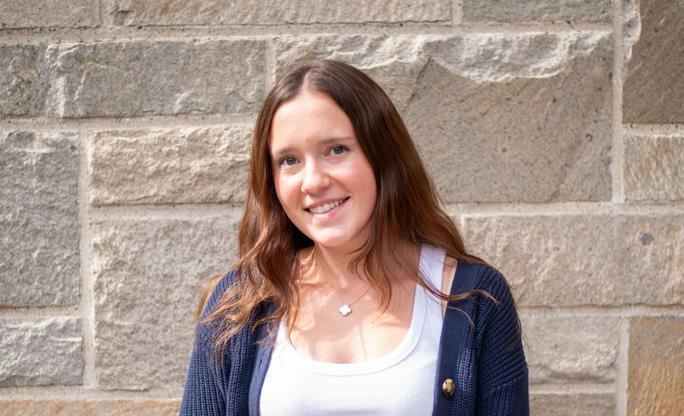
One-thousand five-hundred square feet of home, overflowing with timeless memories and family history, and a young girl beneath the table. The kitchen table is the ideal spot for an only child to shelter from the commotion of what some might call an overbearing family.
The car’s engine quieted, headlights glaring through the window faded to darkness, and the footsteps and muffled conversations grew louder. Curled up beneath the kitchen table, I panicked and gripped Bear Bear closer to my chest. The door swung open, and my ears were bombarded with competing “hellos” and “how are yous.” A seemingly endless stream of people filtered in, some sitting on the couch, others at the counter, and a select few at the kitchen table, nearly kicking me in the head, but thankfully not yet seeing me.
As effective as my camouflage tactics were, two jarring words eventually reached my ears: “Where’s Jenny?” That simple phrase forced me to muster up just enough courage to allow myself to be hugged (though never hugging back), before seeking a new safe haven.
As a shy child, this was my routine. While I was comfortable around my peers, adults (especially the loud and affection-
ate variety) terrified me. Growing up as an only child, quiet and with reserved parents, my fear of my boisterous family stemmed from the typical serenity of our home.
Over 40 years ago, my grandfather and his brother, my great uncle, each purchased homes in Otis, a quaint town in the Massachusetts countryside. Each house was modest yet charming—unpretentiously decorated and rusticly furnished. The simplicity of the homes, however, does not reflect the magnitude of growth that has transpired within their aged wooden walls.
My extended family is incredibly outgoing, always engaged in some passionate discussion about the minutiae of each other’s lives. Wherever we are, we make our presence known. Whether we’re occupying half a restaurant or a hotel lobby, our incessant conversation can be heard for miles.
Because I’m an only child, people get confused when I talk about my “huge” family. My first, second, and even third cousins consider each other siblings-by-extension, a sentiment instilled by generations prior. Perhaps that was my grandfather and great-uncle’s intent in buying adjacent homes. Otis has become a time capsule, unifying my family—past, present, and future.
During many childhood summers, my family gathered in Otis for an event we call the Jamboree. This extravaganza consisted of spectacular fireworks, matching t-shirts, and 100 percent family time—a complete sensory overload for my younger self. But as I grew older I envied the outgoing personalities of those around me and longed to escape the confines of my introverted nature. Many anxiety-in-
ducing encounters later (fake it ‘til you make it, after all), I came to treasure the craziness of my family much more than my timid, younger self could have imagined.
Looking back, young me could never have anticipated how significant my family would become to my daily interactions; it is impossible to know me without hearing about this cousin, that uncle, or my stepthird-cousin-once-removed’s new dog. My extended family has molded my understanding of myself, and I eagerly await each Otis gathering.
Now, I am the first to run into the driveway, embracing whoever is behind those headlights glaring through the window. The four legs and flat top of the kitchen table that once shielded me from my biggest fear is now somewhere I thrive, passionately engaged in light-hearted—but deeply meaningful—conversation.
Has my shyness been mitigated through the years? Yes, though I recognize that the frightened, young girl beneath the table will perpetually live within me. I feel her timidity internally in each new encounter. But I regain balance and comfort through echoes of the Otis conversations that have brought me to this place of confidence.
I am grateful to have had role models to help guide the development of my personality, but of course I still appreciate my innate shyness. The same 1500-square-foot glorified wooden box, overflowing with timeless memories and family history, now represents a tangible sense of growth and maturity, with room to house adventures still to come.

Spring Break Is Here
After enduring the midterm exams and research papers that monopolized February, it’s safe to say we’re all ready for a much-needed break. Spring Break is the perfect time to check things off your bucket list, spend time with friends, and boost your morale before diving into the rest of second semester. Whether you’re heading home for a week of relaxation or you’re jetting off to the beach with friends, make the most of this rare responsibility-free week.

Daylight Savings
Daylight savings is just two weeks away, and an extra hour of sunlight is waiting for us on the other side. Even though we’ll lose an hour of sleep when the clocks spring forward on March 10, the sacrifice is certainly worth the 7 p.m. sunsets to come. Warmer weather, sunny afternoons on the quad, and evening walks around the Res are just weeks away. What better way to be welcomed back to campus than with sunlight and signs of spring?


The Final Stretch
Even though Spring Break is on the horizon, a final stretch of exams still stands between us and a week of freedom. Freezing cold walks to class and declining attendance in lectures are certainly taking a toll on morale. With just five days of classes left, try to search for a final surge of motivation—come Friday, we’ll be free from our overpacked schedules and impending deadlines.

Dwindling Dining Bucks
Cold winter days call for steaming hot lattes between classes. While these drinks might motivate us to make the trek to Stokes each day, these daily $7 splurges are slowly draining our Eagle Bucks to the point of no return. With almost three months left in the semester, now might be the time to start reserving some funds for refreshers and iced coffees in the warm months to come. Even though it might not be the same as matcha from the Chocolate Bar, coffee from the Rat is always an option.
Inspired by Kendrick Lamar’s “We Cry Together” and director Sam Levinson’s Malcolm & Marie Angus Williams, singer-songwriter, and MCAS ’25, birthed the theme for this year’s Living in Color showcase—the tensions of inter and outer relationships within and surrounding the Black community.
In comparison to last year, Williams, also known by his stage name CARAMEL, decided Living in Color would run during the span of one evening, merging different types of artistic talent into a single event. Williams gathered two poets, two dance performers, four vocalists, Waaw Waaw Boston College, a violinist, a bass player, and two pianists to make Living in Color an experience that will convey the different stages of racial tension through multiple forms.
“I’m excited to have all the different parts come together,” Williams said. “To see that art come together in one space, all those different genres of art.”
Williams emphasized every mem-
ization, anger, healing, and continuation—each followed immediately after the other as narratives flowing in conversation with each other and each featuring Black talent through poetry, dance, singing, improvisation, and more.
Williams has brainstormed this event since last year, discussing his ideas with his manager and co-producer, Brian Kazinduka, MCAS ’25, ultimately shaping a concrete plan for the ambitious evening. With the event coming up this Thursday, Feb. 29, Williams and his performing team are fleshing out the last details for the day they have prepared for since the beginning of the semester.
“I think this is gonna be a production unlike anything BC has seen before,” Isiaah Clark, pianist and MCAS ’24, said.
During rehearsals, Williams fosters a sense of family and community by directing every performer and witness to gather in a circle to introduce themselves and share their concerns and hopes for the event.
“I’m stressed about how it’s going to look on stage,” Jaylen Keller, Sexual Chocolate member and MCAS ’25, said. Keller will dance alongside Cait-
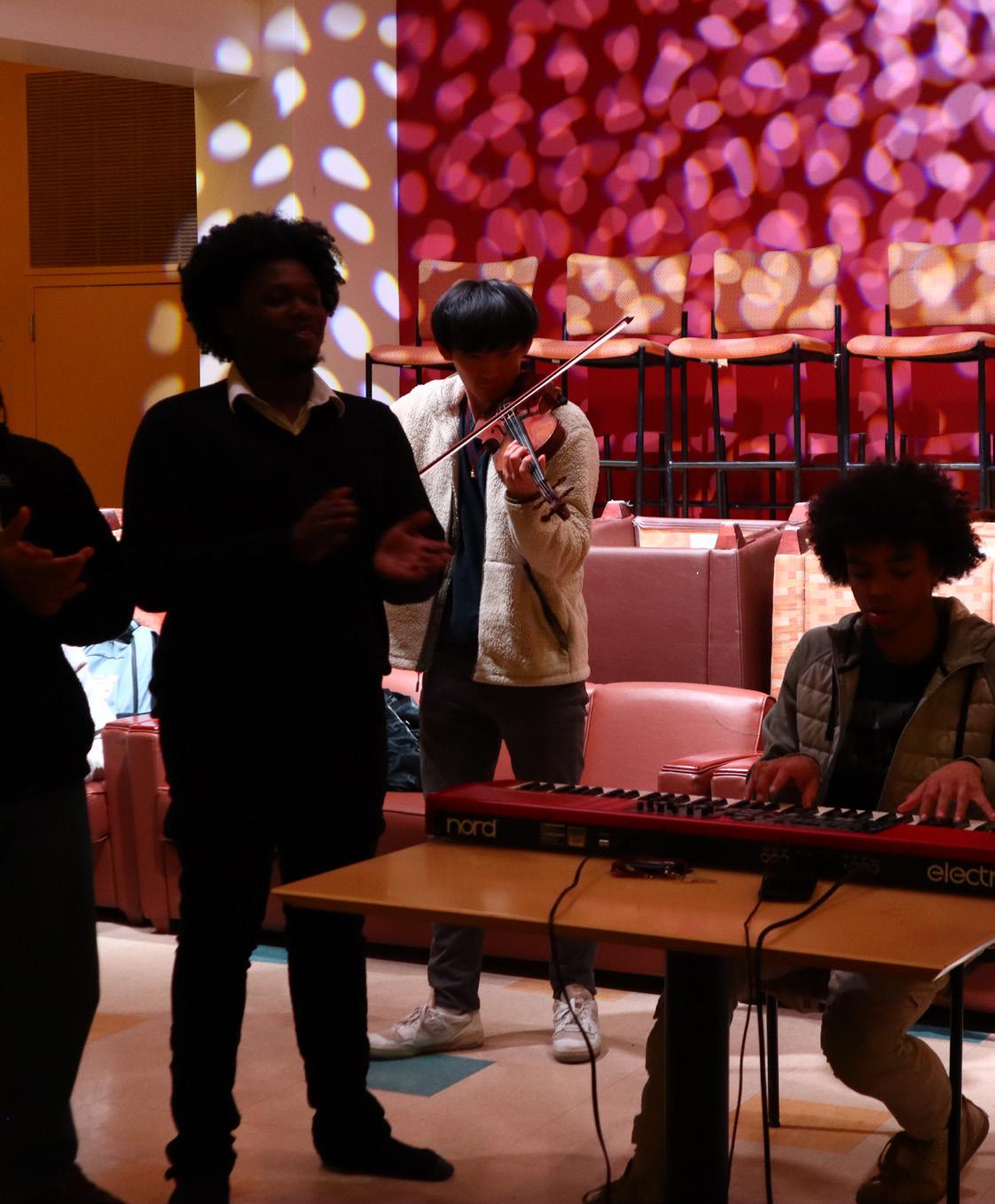
on anger. The creation of a dance that reflected anger in its various forms was a collaborative effort between Keller, Gibb and Williams.
“It definitely felt weird at first,” Keller said. “We were trying to figure out sort of like what we would do just to even start it off with.”
Sexual Chocolate and F.I.S.T.S. have inherently different dance styles, so blending the unique signatures of each group was part of the creative process. Their dancing is also meant to pair with a poem read before leading directly into the dance, so a close lyrical and rhythmic analysis of the poem was helpful in deciding how to craft their movement.
“Once we got into a groove, it was a lot easier,” Gibb said. “Making a step from scratch is actually very hard, and especially when pairing it with like a poem or like music.”
The poetry elements are the core of the show, and are what Williams ultimately uses to anchor the rest of the performing arts.
The words from Benedita Zalabantu, MCAS ’25, and Alioune Diba, LSEHD ’25, drive the five-stage process followed throughout Living in Color.
“I’m looking forward to sharing a
poet because I’ve never done that before,” Zalabantu, a spoken-word poet, said.
Williams gave Zalabantu and Diba themes to base their poems, which they have transformed into poetry that they will perform out loud at different points in the show.
“I’m excited about how the stories will flow into each other and we’re all narrators instead of having one narrator,” Victoria Adegboyega, vocalist, member of B.E.A.T.S. and MCAS ’26, said.
Adegboyega is one of the three vocalists who will sing alongside Williams’ original songs that they have composed for the purpose of this event.
Williams’ artistry and passion was something that inspired those performing in the event, according to Gibb. His drive to put on an event that uses performing arts to capture the racial tensions through five stages makes the event unique from last year’s, and different than any other performance BC has seen before.
“I’m really excited and inspired to see how passionate Angus is about this project,” Gibb said. “He just, like, puts his heart into his art. So I’m really blessed and honored to be a part of
tory Month, Feb. 29, presenting itself as an opportunity for deep reflection on what the Black community means for every individual. Doors will open at 6:30 p.m. at the Vandy Cabaret Room for attendees to access the free event.
“We’ve had that day in our calendar for a long time,” said Kazinduka, who has been working as Williams’ manager since their freshman year.
Williams made it clear that his goal for the evening is not only for performers to interact with each other through their art, but for the audience to feel welcome to join the interactive nature of the event. Performers will stay for Q&As and food will be provided to accompany the theatrical spectacle of this year’s Living in Color.
When people leave the show, there’s not one clear-cut message that the audience will be taking away. According to Williams and Gibbs, the show will hit so many different feelings and evoke countless emotions in any one individual.
“I didn’t want to have, like, a resolution, because this is this performance about the Black experience,” Williams said. “From, like, the African diasporic experience to just Black
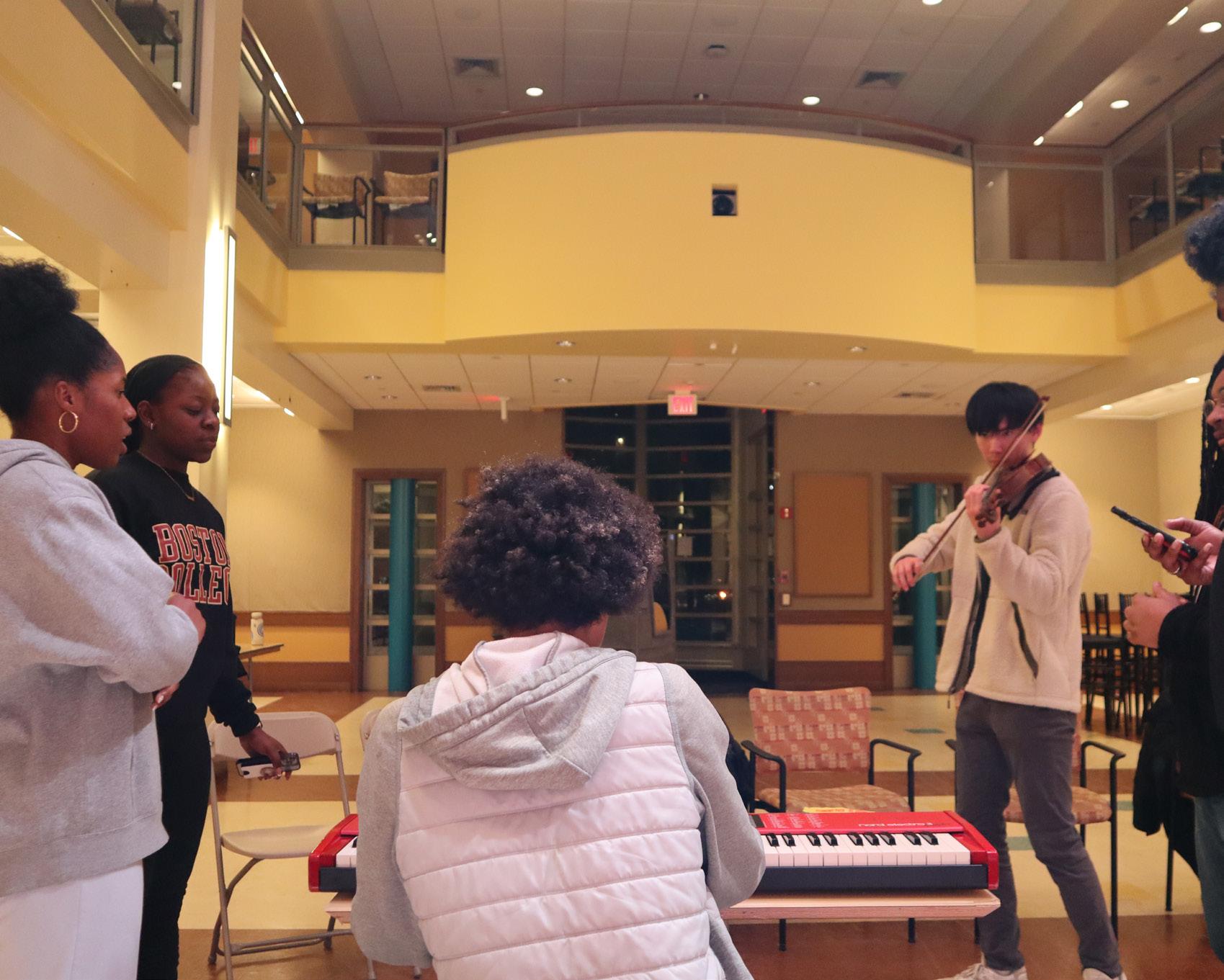
For
the HeightsThe premiere of The Bad Batch season three marks the beginning of the end for the infamous Clone Force 99. After the first three episodes released on Wednesday, Feb. 21, the show’s final season promised Star Wars fans an emotional roller coaster that leaves viewers with a seamless plot transition into the First Galactic Empire.
In the show’s first two seasons, viewers followed the Bad Batch, a group of defective clones with special abilities, as they navigate the galaxy. Originally created for the sole purpose of being soldiers, the Bad Batch soon realized they needed to make a change in their lives. Instead of fighting for the new regime following “Order 66,” the clone squad decided to take their own path and abandon the only thing they know: war. This season, Hunter, Wrecker, and Echo, all voiced by Dee Bradley Baker, need to find a way to rescue their squadmate and fellow clone, Omega (Michelle Ang), who the Empire took captive. Omega begins the season trapped in a maximum-se-
curity research base, while the rest of the team is trying to find any known trace of her.
Season three sets up a typical Star Wars story that reminds fans why they fell in love with Star Wars in the first place.
Seasons one and two set up the foundations for a potential massive story arc, so season three had big shoes to fill with only a few episodes worth of time to fill them.
With this final season, The Bad Batch needs to fill the massive gap in time between the prequel and original trilogies and further the narrative toward the eventual return of Palpatine (Ian McDiarmid) in The Rise of Skywalker, all while pushing the thematic elements that give the show such a unique and refreshing perspective.
Luckily for Star Wars fans, if the first few episodes are any indication, season three is checking all of those boxes.
While kinship, identity, freedom, and struggle continue to be the thematic focal points of the show, an important development arises between Omega and Crosshair (Bradley Baker) that captures the essence of these themes. Both are facing impris-
onment under the Empire, but each have their own individual mindset on said imprisonment.
Omega is highly optimistic about a potential escape, however, Crosshair is on the opposite side of the spectrum. He holds no hope in the slightest, which is directly reflective of his life up until this point.
On this same thought, throughout her plans of potential escape, Omega never contemplates leaving her clone brother behind.
No matter the harm he may have previously caused, Crosshair was still, deep down, a member of the Bad Batch, according to Omega.
Their relationship can best be described as a young and naive girl, blind to the harshness of reality, constantly butting heads with the older, more experienced clone, who is permanently scarred by his past traumas.
The theme of freedom is further dissected during Hunter and Wrecker’s search for Omega.
The two meet a group of stranded clone cadets who were abandoned and cast aside by the Empire. The collective go on to complete a mission that leads the Bad Batch closer to Omega, but other positives come
out of this situation.
The once-forgotten clones are now free and able to make their own choices—the clones are no longer soldiers, but individuals.
Dynamics like these shed light on the clone experience, which is generally disregarded when it comes to the history of Star Wars projects. The world through the eyes of the clones continues to expand on the previous seasons.
As the Bad Batch focuses on rescuing Omega, Palpatine and the Empire are formulating a top-secret plan. Viewers are finally met with what the Empire calls, “Project Necromancer.” The scheme is meant to help Palpatine fulfill his wishes of immortality, thus providing needed information that comes into play

during the sequel trilogy.
Originally, following the release of The Rise of Skywalker, Palpatine’s return left spectators confused and disgruntled. The plot seemed as if the directors and writers were making up the future of Star Wars as they went. Now, The Bad Batch serves as necessary context to explain gaps in the sequel trilogy.
This will likely be of continued importance as the season continues, especially with Omega’s newfound role of being a potential host for Palpatine’s future clone.
While the final journey has just begun, The Bad Batch’s three-episode premiere has laid the groundwork for a fun and action-packed season while still holding onto its original values and purposes as a show. n
Phaymus Celebrates 20 Years With ‘The Phuture’
Clad in silver and gold metallic outfits, Phaymus brought an energetic start to the show. As the set ended with Beyoncé’s “HEATED,” choreographed by Ore Adedeji, MCAS ’27, the group pulled out decorative fans, incorporating them in a playful twist on the song’s title.
The group brought in Vida de Intensa Pasión (VIP) to perform its fall set, previously seen during the Week of Dance showcase in December. With its signature red and black outfits, VIP’s fiery set hyped the audience up for Phaymus’ return.
Then hosts introduced Phaymus’ “Phall Set,” also from the Week of Dance showcase, describing it as a
choreography “all about being ‘that girl,’” and they proved it.
Choreographed by Chloe Chen, CSOM ’24, Destiny Gonzalez, MCAS ’24, and Letacianna Stoudmire, MCAS ’24, the set featured the group’s classy sunglasses and bandanas seen in the fall show. One dancer leapt off others’ backs during “Goodies” by Ciara, and the audience exploded with cheers as the set ended.
The group then invited UPrising to perform a set from its showcase “Waves VII” earlier this year. UPrising began the set by pretending to whisper to each other, then broke into smaller groups for a spirited dance to Rihanna’s “Disturbia.”
Phaymus returned in red and
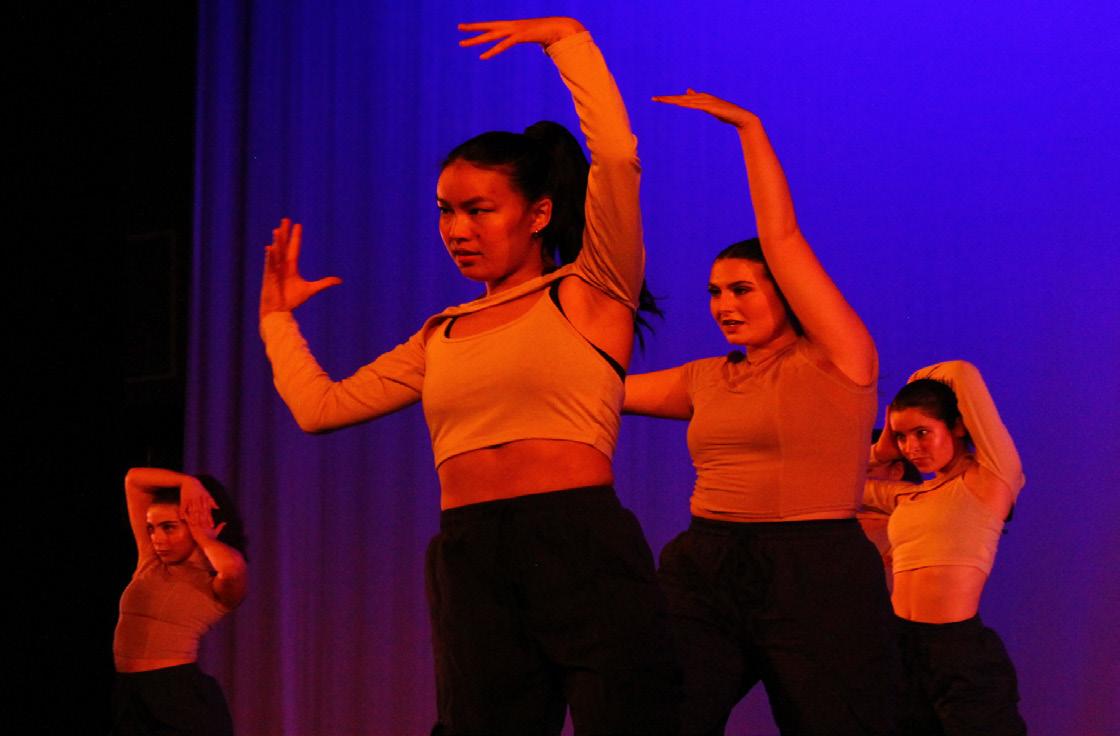
black for its “Phuture” set. The set gave the audience a glimpse of the choreography skills of the group’s future upperclassmen members. The audience cheered and whistled as the group stomped to Jay-Z’s “Dirt Off Your Shoulder,” choreographed by Carrie Chen, MCAS ’26.
After an intermission, the group played a video of Phaymus performances over the years, beginning with its 2007 appearance on Black Entertainment Television’s (BET) show 106 & Park. The video showed clips from past showcases, including footage from their participation in World of Dance , and ALC Showdown sets.
Phaymus’ new members returned to the stage for a reprisal of its Rookie
Showcase set from earlier this year, wearing shorts with “ROOK” emblazoned in bright red across the back. The audience sang along as it danced to Doja Cat’s “Paint the Town Red,” choreographed by Stoudmire.
The new members then yielded the stage to the seniors for their senior set. The senior dancers showed off their custom baseball jerseys, reading “Phaymus ’04” across the back, as they danced to “Show Me The Money” by City Girls. They ended the set with a final hug, then yielded the stage to another guest group.
Boston College Dance Ensemble took over the stage for its “Fergalicious” set from the Week of Dance showcase, showing off its perfectly
executed formations to a medley of Fergie and Black Eyed Peas jams.
For its final set, Phaymus choreographed a lineup of dances both new and inspired by old Phaymus sets, including its 2007 BET performance. The set was the most impressive and technically challenging of the show, including a chair dance.
The group’s final dance to Missy Elliott’s “Bad Man” was choreographed by Kevin Owens, BC ’08, Jermaine Curtis, BC ’08, and Laura Ononibaku, BC ’08, founding members of Phaymus.
As the group ended the set with splits, alumni and students alike rose for a standing ovation, showing the impact the group has and will continue to have on dance at BC. n
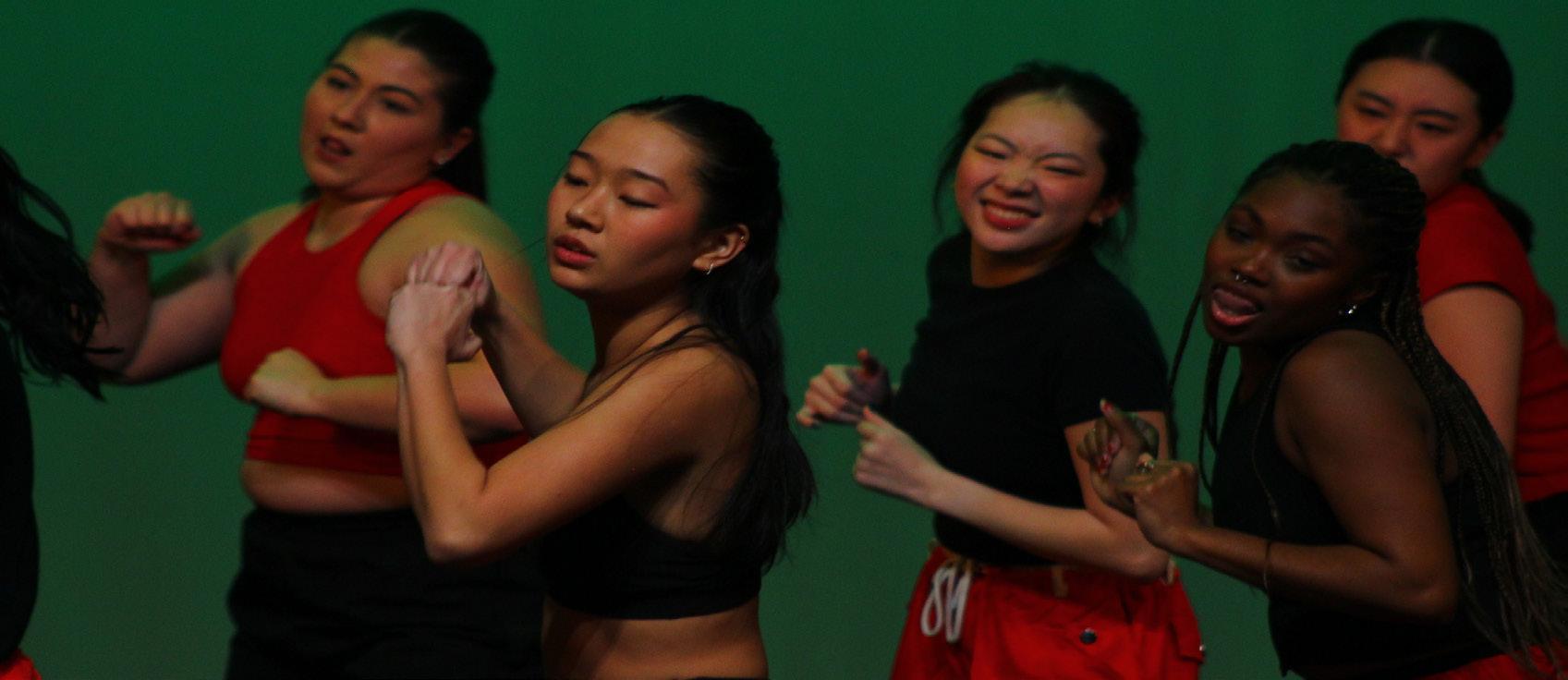
B y A shley VA lenzuel A Heights Staff
As every row of St. Ignatius Church filled with friends and family on Saturday night, Boston College University Chorale members dressed in black tie faced the audience and began singing “Les Chansons des Roses,” a choir piece about self-love.
The choir’s voices flowed into a beautiful three-part harmony reminiscent of a midnight mass, setting the tone for the night. As the first song came to an end, Riikka Pietiläinen Caffrey, the first-year director of Chorale, addressed the audience and introduced the concert.
A night filled with reflection, hope, and a little Dolly Parton, Chorale’s “Rock-A My Soul” performance on Feb. 24 explored American vocal music traditions that helped the audience reflect on themselves and remain optimistic.
The audience began clapping as Caffrey proceeded into position. The crowded cathedral room grew silent with anticipation. Members of the choir hidden within the crowd stood and began to sing “Wanting Memories” by Sweet Honey in the Rock.
The group of students made its way to the front of the room with the rest of the choir and the size of the choir grew, the music and vocal power growing as it finished
the song.
Two choir members then addressed the audience to introduce the story of Alice Parker.
“Alice Parker was an American composer who paved the way for female composers in worship music who sought to teach others to see beauty in the world,” they said.
The choir once again erupted into song with Parker’s “Hark I Hear the Harps Eternal.” Having passed away recently, the choir sought to remember Parker’s contributions to fighting against social injustice and advocating for peace through spiritual music.
BC professor and composer Shannon Jacob then approached the
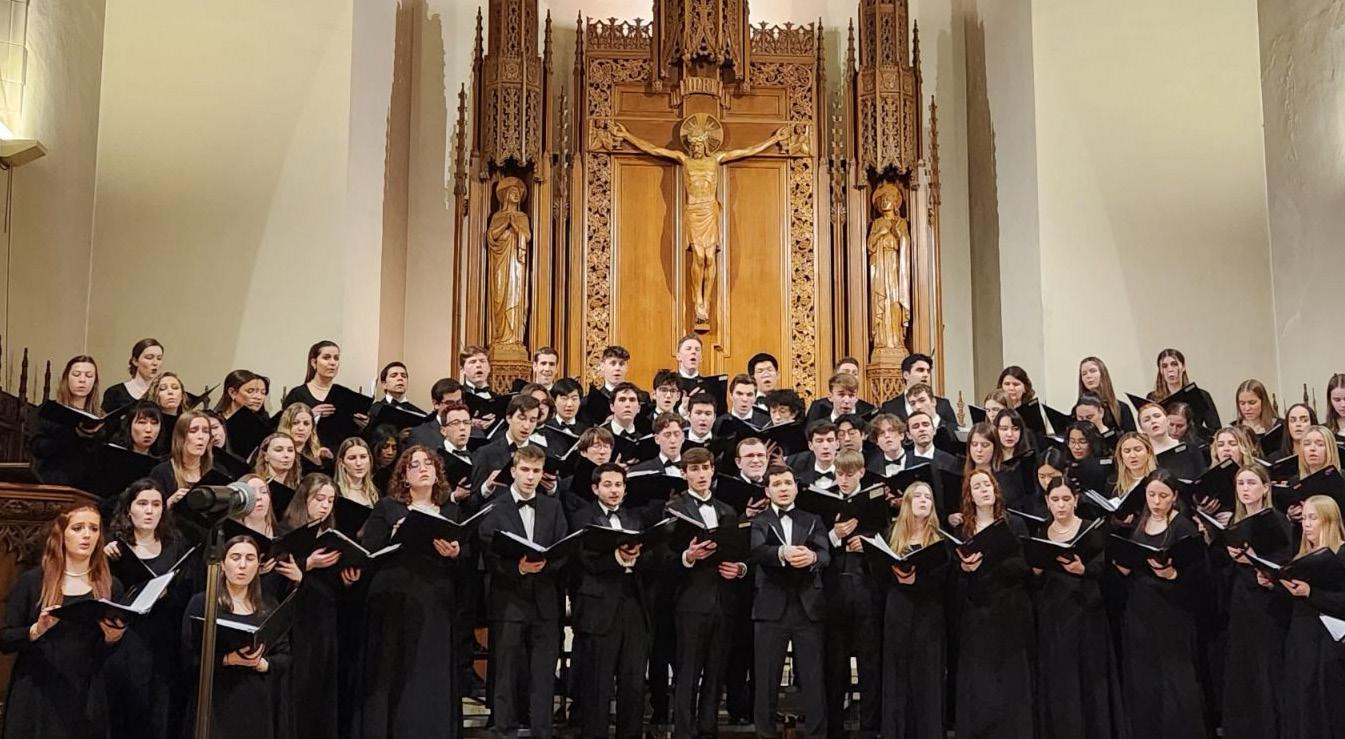
crowd and introduced a set of spirituals for the concert’s next portion.
Spirituals, according to Jacob, are now a widely celebrated form of culture originally sung by enslaved African Americans during the 1800s. They were sung during long hours of labor and were known as “work hollers.”
Jacobs stated these songs were a way to cope with the oppression they faced, sung only “during the most bitter anguish.” A small section of the choir stepped forward behind Jacobs and began singing “God’s Gonna Set This World on Fire.” Chorale’s voices started out joyfully, in contrast with the ominous lyrics of the song. The choir
slowly began to fade in volume, getting quieter and quieter as it continued. Just before the sound completely faded, the choir burst into the final line with its loudest volume of the entire performance. The spirituals’ powerful lyrics showcased human resilience.
Chorale members reminded the audience that “there is always light at the end of the tunnel” as they introduced their last two songs, including “Light of a Clear Blue Morning” by Parton and “Let the River Run” by Carly Simon.

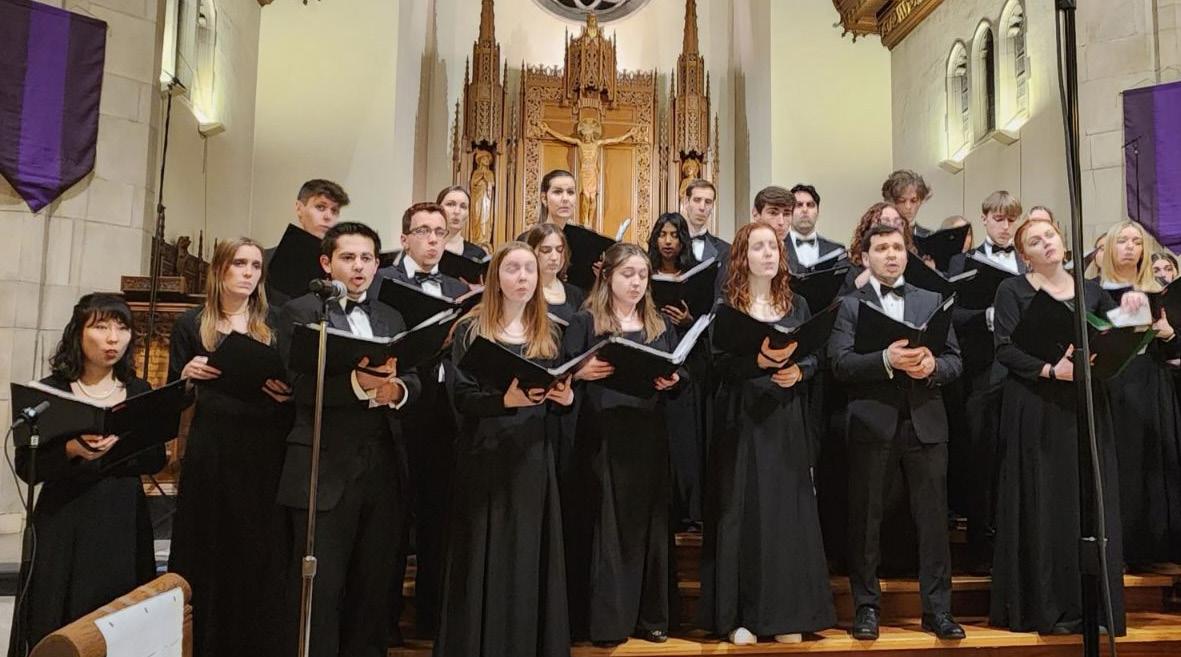
in D major,” featuring
classy
miere of a composition composed by BC professor Shannon Jacob, solos by three student winners of the 2023–24 Concerto-Aria Competition, and the music of notable composers like Wolfgang Amadeus Mozart, Gian Carlo Menotti, and Gaetano Donizetti. The concert began with BCSO playing Mozart’s “Violin Concer-
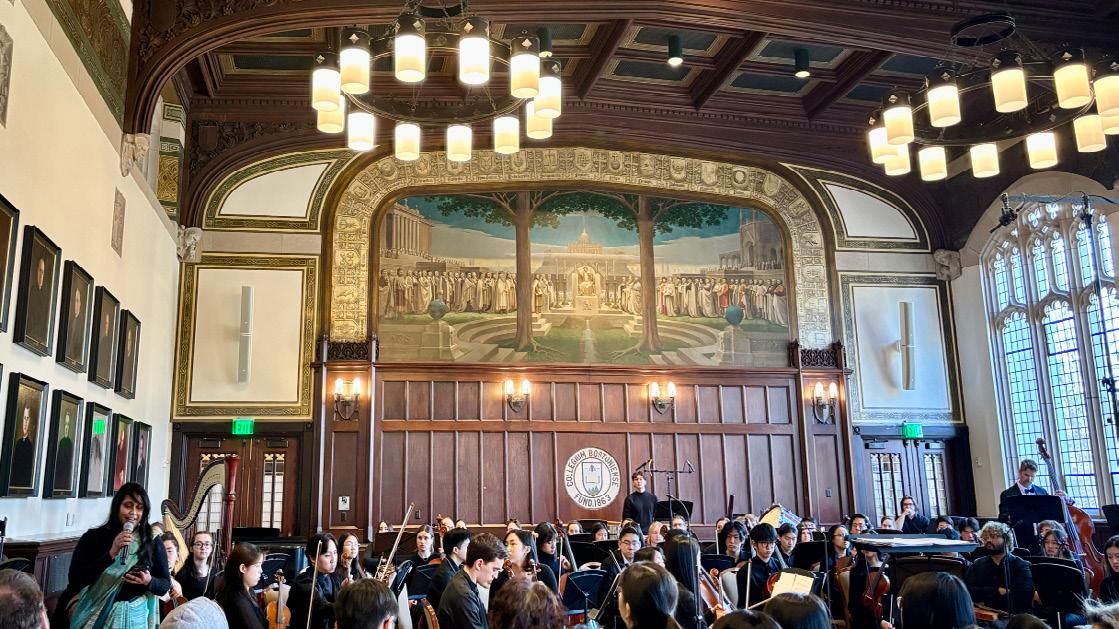
beautiful
Lee’s impassioned and intricate performance, coupled with the backing of the BCSO, left the audience in awe and garnered a thunderous applause.
The program then progressed to BCSOs renditions of Donizetti’s “Bella siccome un angelo” and Ralph Vaughan Williams’ “The Vagabond,” both of which featured vocal baritone soloist Colin Klein, MCAS ’24, another winner of the Concerto-Aria Competition.
“This was honestly one of the coolest things I’ve done,” Klein said. “Normally, I just sing with a piano, but singing with the whole orchestra was so much more fun.”
The fourth number of the
program featured the third and final winner of the Concerto-Aria Competition, soprano vocalist Alexandrina Weingart, MCAS ’25, who sang a gorgeous rendition of “Steal me, Sweet Thief,” composed by Menotti. Weingart’s heartfelt expressions coupled with her stunning vibrato made this an outstanding number.
One of the highlights of the concert was the fifth piece: the U.S. premiere of “Motherlands: Belonging,” which was composed by Jacob. Jacob is also the director of Voices of Imani, BC’s gospel choir. Jacob’s piece felt magical, and the audience could feel the message of belonging that Jacob based her composition on.
“I am just so happy that so many people got to experience this because I wrote this for the community,” Jacob said. “To have
everyone show up and hear it meant the world to me.”
The concert ended with the BCSO playing Edvard Grieg’s “Peer Gynt Suite No.1,” which featured four movements: “Morning Mood,” “The Death of Ase,” “Anitra’s Dance,” and “In the Hall of the Mountain King.” The blend of the instruments and Wittstruck’s passionate conducting made this piece a brilliant finale to an outstanding concert.
Overall, the BCSO concert wonderfully showcased its talented musicians, both students and faculty, who practice their talents in the BC community. From the strong blend of instrumentalists with stunning vocal and violin soloists to the brilliant conducting and composing of BC faculty, the BCSO concert highlighted BC’s musical talent. n
Boston College men’s hockey has held the No. 1 ranking in the nation for four straight weeks, and most recently swept Vermont with 7–1 and 4–2 wins.
“Smitty, to be able to get that insurance goal was enormous at the end,” BC head coach Greg Brown said. “Having a twogoal lead when the other team’s gonna pull their goalie definitely gives you a little bit of cushion.”
The Eagles (25–5–1, 17–3–1 Hockey East) held off Vermont (12–15–3, 6–11–3) in the waning minutes of the third period and completed the sweep of Vermont to earn their sixth straight win.
Despite missing its leading point scorer entering the game, Gabe Perreault—who recently hit the 50-point mark on the season— and its captain Eamon Powell, BC still downed Vermont in Conte Forum on Saturday night.
“Hopefully, okay,” Brown said of Perreault and Powell. “They’re not season-ending things. Hopefully they’ll both be back next week, if not very soon after that. They just weren’t fit enough to go tonight … Initial reports are that they’re not long term.”
BC switched up its lines for its tilt against the Catamounts as a result of Perreault’s absence. The No. 5 overall pick in the 2022 NHL Draft, Cutter Gauthier, skated alongside the No. 4 and No. 8 picks in the 2023 NHL Draft in Smith and Ryan Leonard. The line tallied all four goals for the Eagles and totaled a combined eight points.
“A lot of good things,” Brown said of what he saw from Gauthier, Smith, and Leonard. “Especially right at the beginning of the game, they were flying together, that was really good. They’re three very good hockey players, and they read each other well, so they had pretty good instant chemistry.”
The game got off to a less than ideal start for the Eagles when Leonard was sent to the penalty box just 25 seconds into the game for diving. Vermont made quick work of the No. 1-ranked penalty kill in the country, putting the Eagles in a one-goal hole just 10 seconds after its advantage started.
But the Catamounts could only contain the high-powered Eagles’ offense for so long, and BC took advantage of a sloppy Vermont turnover just over five minutes
later. Leonard knocked the puck off Luca Münzenberger’s stick and Gauthier corralled it before sending it back to Leonard, who deked out Catamounts’ goaltender Gabe Carriere and tied the game at 1–1.
Leonard struck again later in the first period to hand the Eagles the lead with 8:28 to play. On the rush, Leonard received a cross-ice pass from Gauthier and skated toward Carriere before sending a backhand shot on net. Carriere rejected Leonard with his blocker, but Leonard found the rebound and shoved another backhand shot toward the net that ricocheted off Carriere and into the back of the net to give BC a 2–1 lead.
The Eagles had an opportunity to make it a two-goal game late in the period with a 5-on-3 opportunity and a 5-on-4 chance, but failed to extend their lead heading into the second frame.
BC had a total of six power-play opportunities, but converted on none of them throughout the night.
“Their penalty kill was excellent,” Brown said. “They stayed tight and together and then when you take two out of your five guys on the powerplay didn’t play tonight, so the chemistry just wasn’t there. Puck wasn’t moving as fast as it usually can. Full credit to their penalty kill, but also, we didn’t keep the tempo that we’re used to keeping on the power play, that’s why you have to find other ways to win.”
Vermont notched the tying goal 2:55 into the third period when Ryan Miotto beat Jacob Fowler to make it a 2–2 game, but the game didn’t stay tied for long.
The Eagles regained the lead just over a minute later when Gauthier tallied his 29th goal of the season.
Leonard forced a Catamount turnover while Vermont was on the power play, and dished the puck to Gauthier who slapped a one-timer home to make it 3–2 BC. Then, Smith’s solo goal put the game out of reach.
“You want to have confidence, kind of coming toward the postseason,” Brown said. “So I think we played a lot of good hockey of late, haven’t had any major areas that we have to improve. We just have to be sharp in all facets.” n
By RoBERt BREnnan Heights StaffThe “Sieve!” chant is a Boston College men’s hockey tradition like no other.
When the Eagles score a goal at home, the student section serenades the opposing goaltender with a choreographed chant reminding the netminder of his name and that he “sucks at life and goaltending,” also noting that the goal that BC scored was “all [his] fault.”
While the students were still faulting Vermont’s goaltender Gabe Carriere for the goal he let up to Cutter Gauthier on the power play with 10:37 left in the second frame, Jacob Bengtsson scored again, causing the student section to erupt and pause the chant, adding insult to injury amid the blowout Catamounts loss. No. 1 BC (24–5–1, 16–3–1 Hockey East) ultimately dominated Vermont (12–14–3, 6–10–3) by a score of 7–1 thanks to a four-goal second period and a combined effort in net from Jacob Fowler and Jan Korec.
some turnovers at the blue line that we didn’t need to do, but oth er than that, we played solid, so it’s a good 60-minute game for us,” BC head coach Greg Brown said. went to its first power play af ter Gabe Perreault drew a trip on Vermont’s Daniel Sambuco while driv ing to the net at the 11:25 mark, but the Cat amount defense held strong.
Seven seconds after the penalty time expired, however, Lukas Gustafsson intercepted an attempted clear by Thomas Sinclair and put the puck top shelf past Carriere, giving BC the lead 13:32 into the game.
BC got its second period started with a dominant three-zone play in which Ryan Leonard laid a huge hit and found Will Smith streaking through the neutral zone, who in turn entered the offensive zone and executed a 3-on-1 with Perreault and Gauthier. Gauthier then finished the play to double BC’s lead 6:38 into the second.
“When I hear one of them call my name from behind me, I kind of just, wouldn’t say hope they’re there, but I know they’re gonna be right behind me and I trust that he’s gonna be open if he’s calling for it,” Smith said, “So once I got it, I was able to execute that pass over to Cutter.” Gauthier got another power-play goal on yet another feed from Smith 2:45 after his first goal to give BC a three-goal lead 9:23 into the period.
“Their second power play goal was a couple of good quick passes and a pretty
chant just 14 seconds later at 9:37 to make it a four-goal lead.
Andre Gasseau continued the onslaught when the puck fell into his lap in the slot, burying it with 8:12 left in the period.
“Scoring wasn’t there in the first, but we did generate a lot of good chances, and then [in the] second period we were able to convert a bunch of them and get a decent lead for ourselves,” Brown said.
Mario Gasparini got one back for the Catamounts with 7:15 left in the period, but it would be their only goal of the night. BC wasn’t done scoring, though. Smith was able to take the puck away from Joel Määtä and pirouette into a pass to Perreault at the back door, who finished the play just 19 seconds into the third frame.
“We get a lot of rush chances, but just trying to get more sustained pressure,” Smith said. “I mean, forechecking is a huge way that we can score goals, so I think that’s something we’re trying to do a lot more.”
Aidan Hreschuk hammered one home 9:25 into the third to wrap up a dominant win for the Eagles in the front half of the series.

Down by two goals at the start of the third period, Boston College women’s hockey needed a goal to keep the possibility of a comeback alive.
Gaby Roy seemed to be the difference maker the Eagles’ offense needed. After receiving a pass from Abby Newhook, Roy faked a New Hampshire defender and fired the puck into the top right corner of the Wildcats’ net.
But BC would not be able to hold onto this one-goal differential— or tie the game up. With 4:17 left to play in the third period and New Hampshire on a power play, Kira Juodikis launched the puck past BC goaltender Grace Campbell as UNH
fans chanted in Conte Forum.
Coming off a 3–1 loss to New Hampshire (17–15–2, 14–11–2 Hockey East) the night before, the Eagles (14–13–7, 13–9–5) were handed a similar fate on Saturday afternoon and ultimately lost 6–4 to the Wildcats. The loss marked BC’s fourth straight.
“Yeah, tough one,” BC head coach Katie Crowley said. “We fought a little bit harder than yesterday but gave them a few too many offensive chances that they were able to capitalize on, so obviously not the way we wanted to end our regular season, especially one that I thought was pretty good, especially in the first half.”
BC’s offense began to heat up during the first period of its final regular-season matchup. After a New Hampshire goal less than two minutes into the game, BC responded 47 seconds later
with a Sammy Taber goal. Skating rapidly down the ice, Taber shot the puck past the Wildcats’ Sedona Blair, marking the 12th goal of her freshman season.
About six minutes later, Newhook scored her 10th goal of the season off a Sidney Fess assist, bringing the Eagles to a 2–1 lead over New Hampshire, but that would not last for long.
UNH’s Annie Berry’s shot slid past Campbell and into the back corner of BC’s net, tying the game 2–2 with 7:23 remaining in the opening frame.
“I think we need to be a little more battle ready at times,” Crowley said. “You know, I thought we were a little bit better at it today, but for a full 60 minutes, we need to be hungry.”
During the second period, UNH’s offense controlled the game.
Within 10 minutes of the second frame, the Wildcats managed to increase their lead to 4–2. With 3:03 left in the second period, Shea Verrier delivered another goal for the Wildcats to bring the score to 5–2.
Following a late second-period goal from Katie Pyne with 2:28 left to play, the Eagles concluded the second frame down 5–3 to the Wildcats.
“This team has the potential to score a lot of goals and to be very offensive,” Crowley said. “I think that was their mentality going into the third period. We were just finding ways to score goals and trying to create traffic in front, and you know, find ways to score that are different than what we have been doing.” Roy’s goal less than three minutes into the final frame of the game kept BC in the game.
“I think it was an exciting third
period,” Crowley said. “I thought for the most part, maybe excluding a few minutes here and there, we battled pretty hard in this full game.”
Another goal from Juodikis in the last five minutes of the game stretched the Wildcats’ lead to two, sealing a 6–4 win.
As the Eagles enter the postseason, Crowley believes the team’s morale will motivate them through playoff play.
“This team, I can’t say it enough, and I’ve said it a lot this year, but they’re always having fun and they’re always fighting for each other,” Crowley said. “And I think that’s the biggest thing that this team does and can do as we get into playoff time.”

The Eagles answered the Mavericks’ early runs thanks to a two-RBI single by Nick Wang in the third inning that came on a full count and knotted the score at two runs.
“Nick is talented, like a lot of players,” BC head coach Todd Interdonato said. “Everybody at this level is talented, but his mindset and his approach is what sets him apart.”
Headed into the fourth inning tied 2–2, the Eagles were able to seize an opportunity off Maverick errors. Sam McNulty hit a hard ground ball that ran under the glove of Jordan Medellin.
Medellin was charged with an error on the play, and Vince Cimini scored.
The Eagles went on to score three runs in the inning, and the game headed into the fifth with BC up 5–2. Farinelli returned for the fifth, but could not continue the dominance of the three prior innings, and JD Moreno scored on a double play, cutting the Eagles’ lead to two.
A run from Cimini in the top of the sixth reclaimed the Eagles’ three-
run lead, but the bottom half of the inning was not as kind to BC.
Evan Moore came into the game to relieve Farinelli, and allowed two walks, then a single to right field. Moore’s command issues gave the Mavericks a chance to ambush a new pitcher: Beck Milner.
Milner gave up three straight doubles, giving UT Arlington an 8–6 lead headed into the seventh.
“We just got to be able to land an off-speed pitch out of the bullpen more consistently,” Interdonato said. “This is a bitch of an inning. This sucks. This is a gut punch. But we come back on offense, like we just have to have good at bats.”
The Eagles’ offensive approach was nearly perfect in the eighth inning, and they picked up nine runs to turn a one-run deficit into a 16–8 lead.
“I said to the four guys or five guys on the mound, like, ‘Hey, this can’t sway how good we’ve been offensively,’” Interdonato said.
In the top of the eighth inning, the game reached a tipping point when the Eagles put runners at third and
second with one out. Adam Magpoc was battling with a 2–2 count in danger of striking out. Magpoc checked his swing, and the ball flew to the backstop. Cam Caraher came sprinting home to score the tying run. Parker Airhart then made a throw which hit Caraher’s feet, as he scored. “You know, this isn’t football or basketball where you can run plays for certain guys,” Interdonato said. “We asked our guys in September to commit to the bunt
and being able to execute it when called on.”
The Mavericks made their fourth and final error in the ninth inning, allowing Cimini to pick up another run and cap off the Eagles’ 17–8 win.
The Eagles faced UT Arlington on Saturday too, taking home a 3–0 win. BC shut out UT Arlington behind a combined effort from A.J. Colarusso and Tyler Mudd. The pair walked only two batters and struck out nine. n
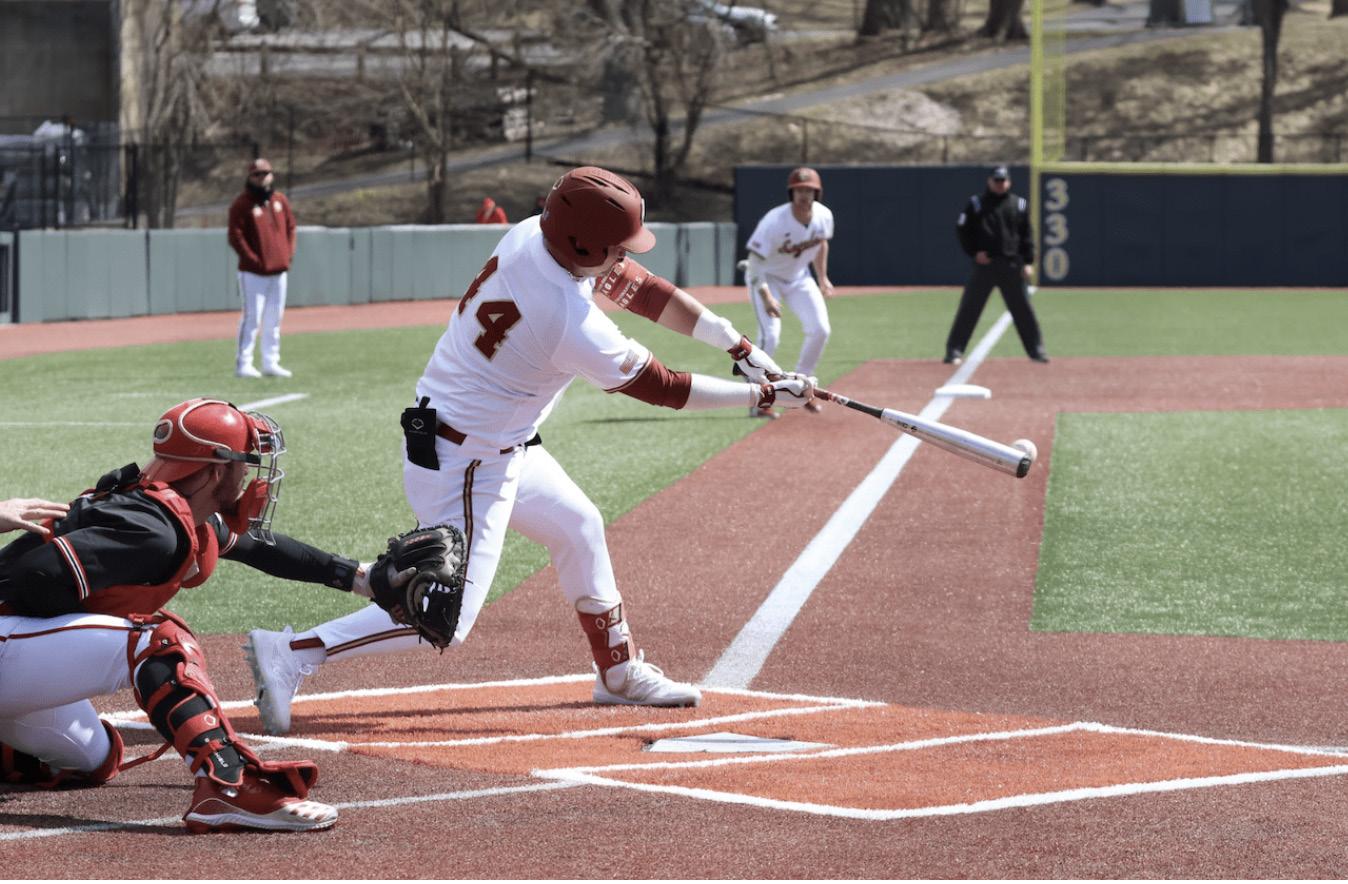
With 7:27 left in the fourth quarter of the game between Boston College women’s basketball and No. 19 Notre Dame, the Eagles cut their deficit to eight after trailing by as many as 15 earlier in the quarter.
Notre Dame’s Maddy Westbeld responded with two jumpers to push its lead back up to 12, and the Fighting Irish never looked back.
Notre Dame would go on a 24–8 run to close the game, eventually winning 79–55.
In the first quarter of the
matchup between Boston College (11–18, 3–13 Atlantic Coast) and Notre Dame (21–6, 11–5), the Eagles dominated.
BC got off to a hot start, leading 14–3 with 4:23 remaining in the first quarter. The Eagles were led by JoJo Lacey, who posted seven first-quarter points.
BC ended the period with a 21–11 advantage.
“I thought defensively we came out of the gates really engaged and playing well, then credit to Coach [Niele] Ivey, they made a couple of adjustments and then we didn’t necessarily flow into the overload adjustments that they made,” BC head coach Joanna Bernabei-Mc-
Namee said.
The Eagles struggled immensely in the second quarter, posting just four points in the frame.
Notre Dame, on the other hand, caught fire and eventually took a 29–25 lead going into halftime.
Turnovers plagued the Eagles in the second quarter, as they totaled nine giveaways in the frame. BC ended the game with 22 total turnovers.
“I think we looked rushed,” Bernabei-McNamee said. “There’s no reason to be rushed against a 2–3 zone, but we were trying to thread needles inside and they were getting stolen.”
Dontavia Waggoner helped
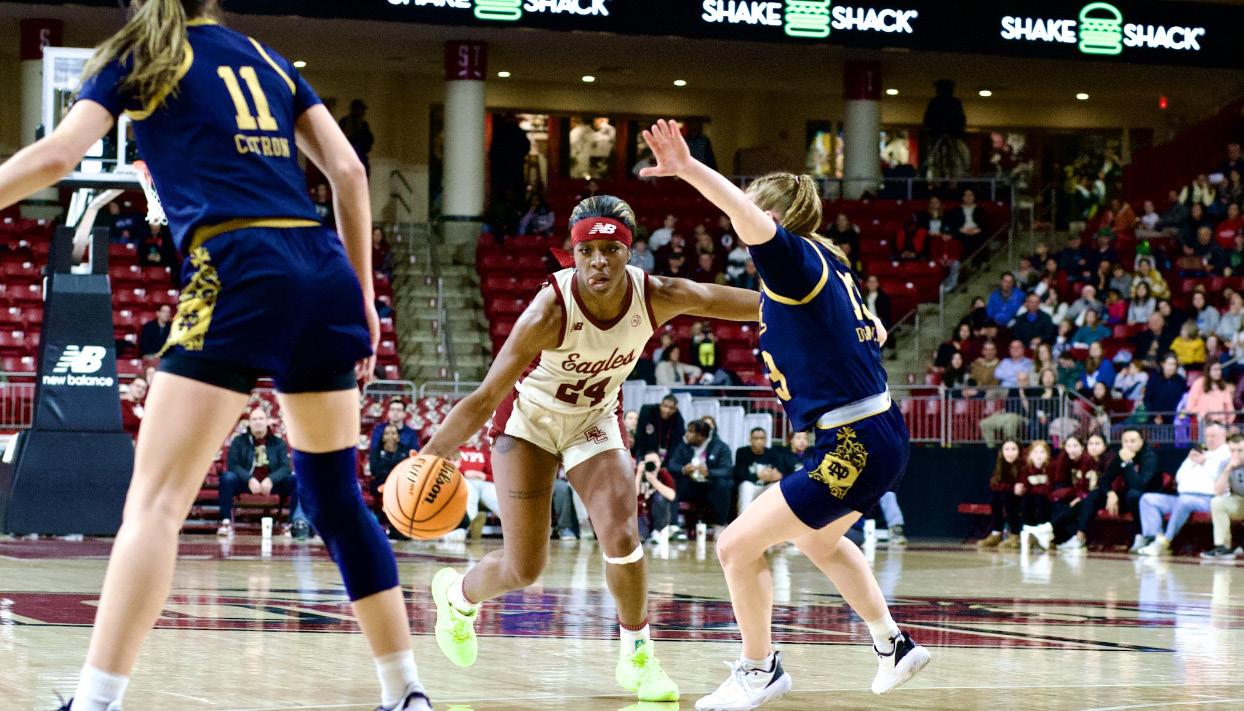
keep the Eagles afloat, and she ended the game with 25 points and 15 rebounds. She is just the second player in the ACC to post this statline this season.
“I thought she played an unbelievable game, probably one of her best games this season as far as she was engaged and playing tough,” Bernabei-McNamee said. “So, really, really proud of how she played.”
Waggoner’s offensive prowess did not keep the Eagles in the game for long, though.
A successful and-1 from Notre Dame’s Sonia Citron with 3:03 remaining in the third quarter pushed the Fighting Irish lead to 15. Notre Dame took a 53–40 lead heading into the final frame.
The Eagles got within eight points in the fourth quarter game before the Irish asserted their dominance and closed the game strong. The Irish were led by Hannah Hidalgo, who posted a teamhigh 19 points in the afternoon.
Despite their 30.8 percent field-goal performance, the Eagles dominated the glass all game long. BC ended the game with 20 offensive rebounds, led by Waggoner’s 12—the most in an ACC game this season.
“We always try to crash the glass, and we always say we want to control things we can control,” Bernabei-McNamee said. “The hustle, the rebounding is one of those things.” n

In Boston College men’s basketball’s first conference matchup of the season, NC State took the Eagles to overtime at Conte Forum in a thrilling and heartbreaking finish for BC.
Saturday’s rematch in Raleigh, however, didn’t provide a similar level of suspense. The Wolfpack (17–10, 9–7 Atlantic Coast) took 33 seconds to establish its first lead of the game and never let up, taking the second game of its season series against the Eagles (15–12, 6–10) by a final score of 81–70.
“You play this game, you’re gonna have some tough games and then you’re gonna have some games you play really good basketball,” BC head coach Earl Grant said after the game. “Today was one of our tough games.”
Plagued by turnovers, BC’s halfcourt offense struggled to string to-
gether baskets early on, taking over 11 minutes to reach the double-digit mark.
“We just needed to be better,” Grant said. “I think NC State had something to do with it. Obviously we play good basketball offensively, so we know what that looks like and I think the turnovers really flipped the game.”
Taking care of the ball has been the Eagles’ calling card for much of the season. BC’s average of 10.6 turnovers per game prior to Saturday’s matchup ranked as its lowest turnover rate since BC began tracking the statistic in the 1979–80 season.
NC State, however, turned ball security into BC’s Achilles heel. The Eagles racked up 11 of their 16 total turnovers in the first half—a setback they failed to recover from.
“We just had a segment where we couldn’t take care of the ball at the level we needed to take care of the ball,” Grant said. “They pressured us, kind of got us out of character, got some steals and a couple of transition threes. The
game took a big jump from five to six points—it went to 14 pretty quick.”
Despite its turnover woes and two early fouls against Quinten Post and Mason Madsen, BC still found itself in striking range entering the second half, trailing the Wolfpack 38–26.
Though Jaeden Zackery opened up the second-half scoring with a fastbreak layup, the floodgates opened up soon after for NC State.
A 9–0 NC State run put the Eagles on life support just three minutes into the second half, facing a 47–28 hole. Grant, however, praised his team’s response to the Wolfpack’s surge.
“Really proud of the guys, just showing great character,” Grant said. “We got down big in the second half and we found a group that went in and played the game the right way and just played good basketball.”
The game only grew uglier for BC following NC State’s early second-half run. Near the period’s midway point, referees assessed Devin McGlockton
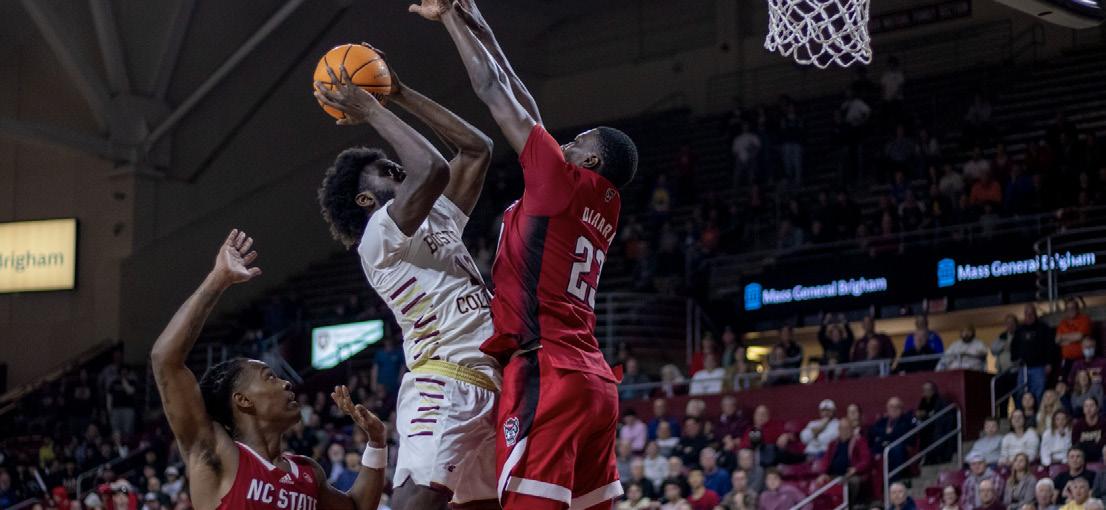
with a flagrant 2 foul and a subsequent ejection after the sophomore forward made contact with Ben Middlebrooks’ face on a block attempt. McGlockton struggled the whole day, going zero of six from the field and scoring a single point at the free-throw line. Post, BC’s leading scorer, recorded six points on a single field goal and fouled out with nine seconds left to play. Together, the Eagles’ starting frontcourt mustered only seven points in total.
“Quinten Post and Devin McGlock-
ton, they didn’t score the ball today much at all,” Grant said. “NC State did a good job of taking them out of situations where they usually score. And they had a tough day.” With the ACC Tournament just over two weeks away, Grant urged his team to remain patient and committed to the process.
“Just stay the course,” Grant said.
“Keep showing up everyday and working hard. You know, it’s a season. We ain’t the only team going through a season.”n